Susan Price's Blog: Susan Price's Nennius Blog, page 4
July 22, 2016
Hot Beer
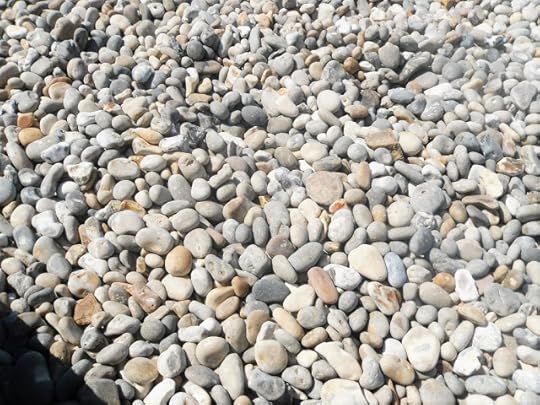
There was, at last, a pause in the English monsoon. The sun came out and so we went to Beer. The English are notorious for their warm beer. This Beer was stonking hot. Feel the heat rising off those cobbles.
Near where the concrete path ends and these cobbles begin, a man was talking to two friends. "She said, 'Now you know what child-birth feels like.' I said, 'I don't want to!' But she held my hand, very kind..."
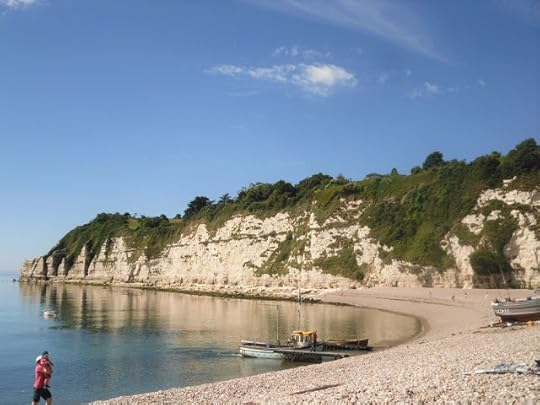
I've never known the sea to be so mirror-still that the cliff's cast such a reflection.
A woman said to a girl of about eleven, "What will your Mum and Dad say when they find out what you've been doing with us?" The girl said, in delighted triumph, "Nothing! I've done nothing!"
Beer competes hard for the village in bloom title. Several doorsteps held enormous scarlet geraniums the size of small bushes. There were window-boxes and hanging baskets and stone pots of marigolds and nasturtiums were part of the street furniture.
The lane leading down to the sea got in on the act too, with valerian, wild carrot, flax, bird's foot trefoil...
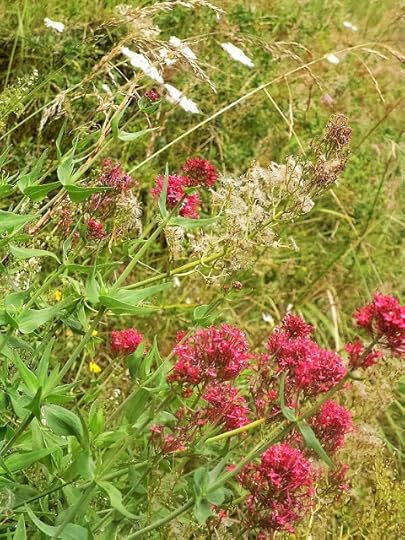
People swam, lay on the hot pebbles and watched the little white sail-boats glide past.
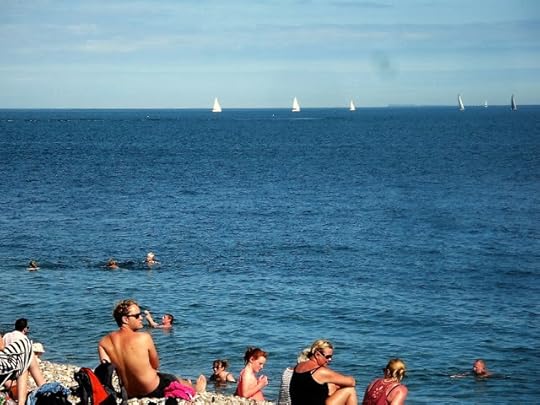
"Is it cold?" - "Brass monkeys are diving and weeping, mate."
We went to Sidmouth for the evening. This sandstone cliff beside the river always catches the evening sun.
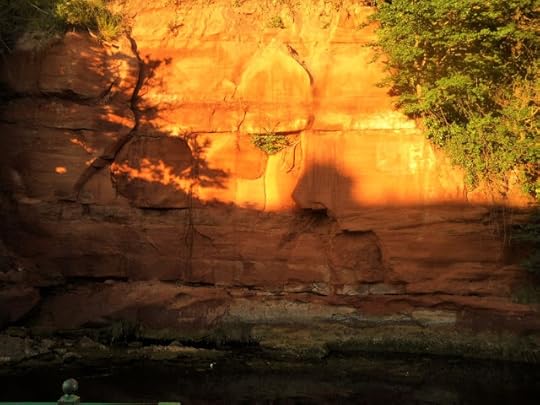
Next day, Beer was just as hot, but there was a strong breeze. All the flags were horizontal.
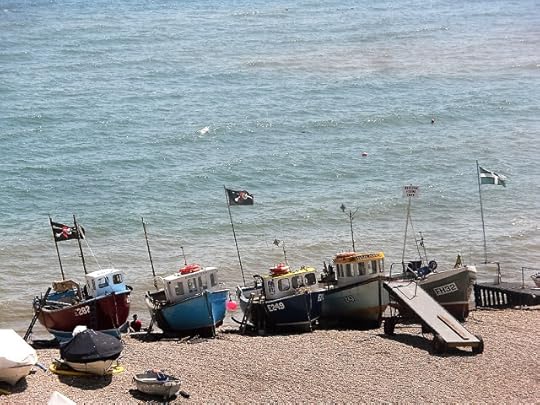
Instead of reflecting the cliff, the sea slapped against it and streaks of orange sand could be seen in the water.
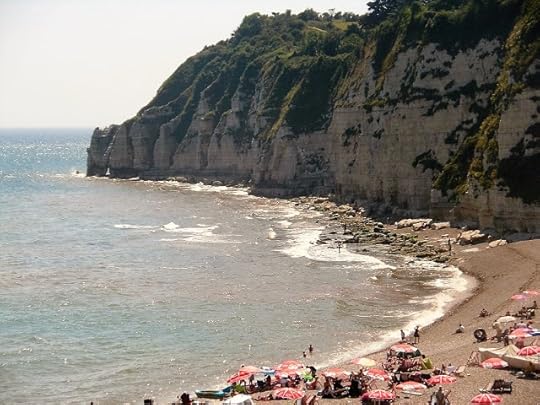
But you could turn your back on it and watch the swallows over the cliff.
As you can see, it's not a crowded place.
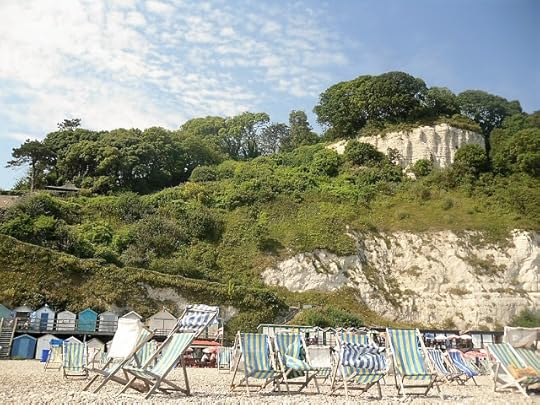
"Shall we get fish'n'chips and eat them on the beach?"
"Better be ready to fight off the sea gulls."
"Yeah, well, there's no shortage of stones."
But you always have to go home. So we climbed up the cliff path, back to the car and the motorway - and the heat without a sea breeze.
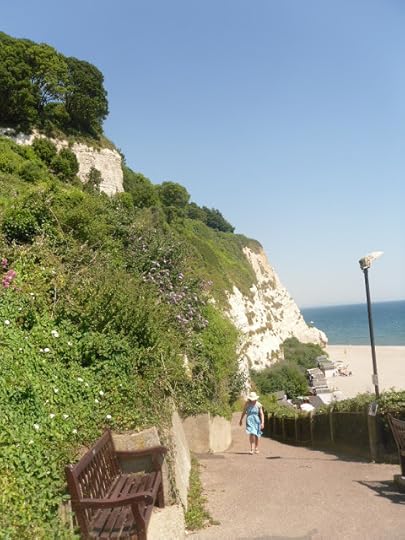
Hope you enjoyed the British summer! Let's hope it lasts a couple of days more.
Published on July 22, 2016 16:00
July 8, 2016
Pond Life
In January this year, we dug a pond. You can see the lovely thing below.
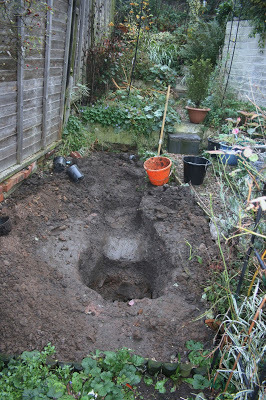
The idea was to make our backyard more enticing to wildlife. A pond is the way to go, apparently, if you're interested in doing that.
We laboured over our hole in the ground for many a day. It was cold. It was muddy. It was unattractive.
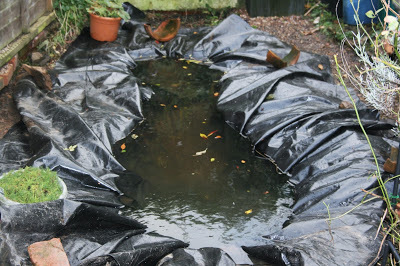
Just to make it even more unattractive, we added a black plastic liner. I can't remember if this was the original which sprang a leak after a couple of weeks, or the later one which is still bravely holding water. We weighted the liner down with pots and bricks, to prevent it thrashing about in the frequent gales. In the picture above, it's frozen solid.
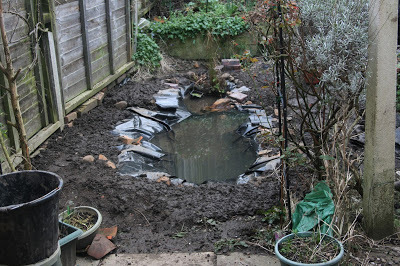
Here it is a little further along, still looking unlovely. We've covered some of the liner with earth, and added some plants at the further end. They came from my old pond in a pot (which also sprang a leak and will probably have a tree planted in it at some point.) The pond here is brimming full from the winter downpours. At the moment, it is brimming full from the summer downpours. A couple of weeks ago, the sunshine was so liquid, we had to bale the pond out for fear of flooding.
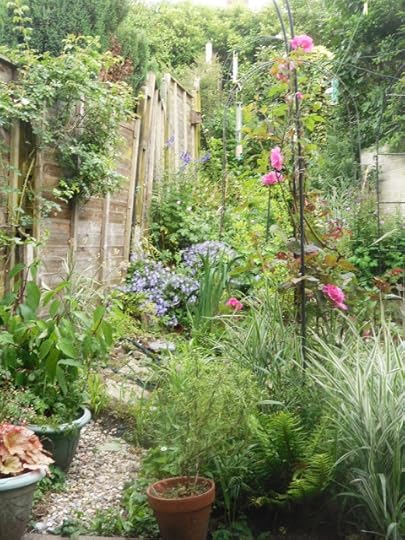
This picture was taken earlier this week. Those tall, pointed leaves in front of the blue periwinkle are yellow flags donated by Karen Bush aka Madwippit. They are excelling at the tall pointy green leaf bit, but have so far declined to flower. But the wild strawberries Karen gave me are flowering and fruiting. You can just see one of their white flowers above the potted rosemary in the foreground.
Here's one where you can actually see the water.
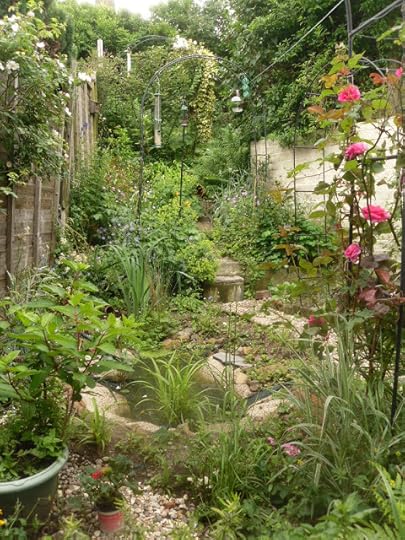
We were promised that if we did the work and made a pond, we would see more wild-life and the promise has been kept. I have seen more birds in the garden this year than in the past sixteen years I've lived here. Previously, they just flew over, even when I hung feeders out.
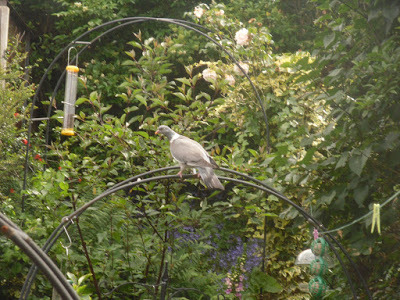
There is always a wood pigeon. Whatever kind of food is put out, Woodie is in there first. Here he is yearning after the niger seed which isn't intended for him. But we also have a little family of dunnocks, a wren, a robin, blackbirds, bluetits, great tits, starlings and house-sparrows.
A newcomer was spotted the other day: buff-coloured with marked white wing stripes and a darker head. It's suspected of being a chaffinch, but as yet, this is unconfirmed.
I've become very fond of the sparrows. They love the pond. They come down in a swirl, like falling leaves, and land around its edges, where they drink and bathe.
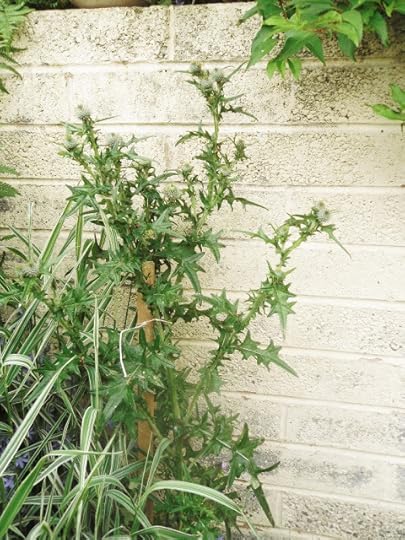
I'm very fond of this brute - 'Touch Me Not With Impunity' and it tells no lies. I was given this by my auntie, who had put on gauntlets and potted it up for me. It spent the winter lying flat in its pot. Then, one spring day, I noticed that all its spiky leaves had lifted themselves up and were pointing at the sky. So I put on armour and planted it against this wall. Since then, I swear it has grown an inch a week and, when the weather warmed up, a inch a day. It is now as tall as I am and you cannot get near it. In Flann O'Brien's The Third Policeman there is a lance with a point so sharp that its end is invisible and it stabs you while you think it is still inches away. Old Touch Me Not is like that. Its flower buds look soft and velvety but touch one and you leap back across the path with your spiked fingers in your mouth. - But we hope that the seeds will attract more birds.
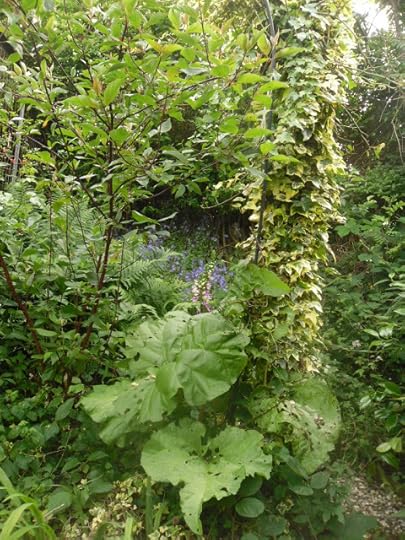
This is the 'wood' at the top of my garden. There is a dogwood, a crab apple, some towering ferns and lots of brambles. And foxgloves.

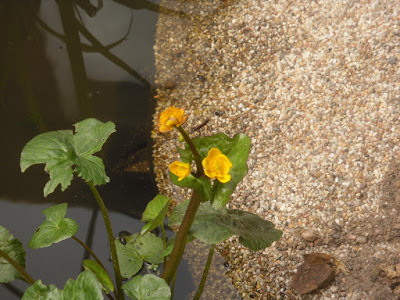
The marsh-marigold in the pond. There is a large bud on one of the water-lilies but it's taking an age to open.
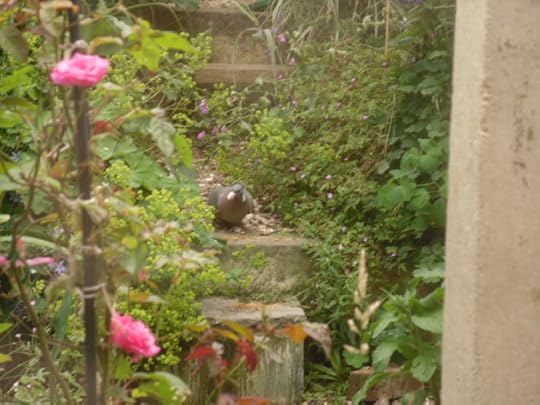
I end with Woodie, getting stuck into whatever it was that was scattered on the step. He's the only bird who hangs around long enough to be photographed.
The pond was worth the work. We've had more fun and interest out of it in these past months than almost anything else.
Published on July 08, 2016 16:00
June 24, 2016
History Of The Naked Ape
Reviewed by Susan Price
Warning: This blog is much longer than usual, but it reviews a fascinating book.
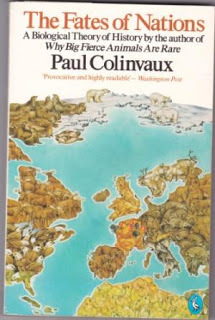
Why does the human race - supposedly intelligent - keep fighting wars, despite all that has been said against the habit?
Why do empires, such as the Roman and the British, periodically rise and then fall or fade away?
Why do leaders such as Alexander, Napoleon and Hitler periodically arise to lead their people into war - and why do the people willingly, even eagerly, follow them?
Why has Europe been, for centuries, a 'cockpit of war' and revolution?
Can the EU prevent such 'Wars of Civilisation' in the future?
Why is the continent of Africa riven with war?
Why are so many vicious, murderous political gangs - I could say 'IRA' or 'Baader Meinhof' or 'Daesh' - drawn from the nicely brought up and spoken boys and girls of the middle-classes, who, on the face of it, have comfortable lives and little need to fight for 'freedom'?
And why, in every part of the world and at all times, have the poor always had many more children than the rich, despite being able to afford them less? Why does contraception and education make little difference to this trend?
All these many questions, and more, can be answered very simply. Niche-Space and Breeding Strategy.
This theory is argued by Paul Colinvaux in his 'The Fates of Nations.' He was an ecologist, and The Fates of Nations answers all these questions by applying the rules of ecology, not to salmon or brown bears or wildebeeste, but to that other animal, the Naked Ape.
Colinvaux defines 'niche-space' as 'a specific set of capabilities for extracting resources, for surviving hazards and for competing; coupled with a corresponding set of needs.' It describes not only the amount of physical space an animal requires to live naturally and healthily, but also the animals' requirements in terms of climate, type and amount of food, type and size of home or lair and so on.
Some niche-spaces are larger than others. An acre of land can support many hundreds of deer, if there is enough water and vegetation. It gives them all they need.
However, that same lush, well-watered acre would not support a single tiger. As a dedicated carnivore, a tiger needs access to many, many deer to feed itself. Deer run away from tigers and many are too fast to be caught. Also, all deer become skittish when there's a predator about. In Yellowstone, after the reintroduction of wolves, deer stopped standing about, grazing like cows. Even when the wolf-pack was in an different, distant part of the park, the deer continued to move on frequently, snatching a few mouthfuls here and there, but never staying in one place for very long.
So a tiger needs to be able to shift ground frequently, to find more unsuspecting prey. Every single tiger needs a large territory, which it will defend from others.
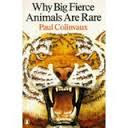 As Colinvaux put in in the memorable title of another of his books, this is Why Big Fierce Animals Are Rare. Long before humans became a plague on the earth, before tigers' habitat was remotely threatened, long before they could be efficiently slaughtered for the supposed medicinal value of their bones, even then, tigers were still rare compared to deer or mice or strawberry plants. They were rare because they had a comparatively wide niche-space. Making a living as a tiger demands a lot of resources in terms of space and prey animals.
As Colinvaux put in in the memorable title of another of his books, this is Why Big Fierce Animals Are Rare. Long before humans became a plague on the earth, before tigers' habitat was remotely threatened, long before they could be efficiently slaughtered for the supposed medicinal value of their bones, even then, tigers were still rare compared to deer or mice or strawberry plants. They were rare because they had a comparatively wide niche-space. Making a living as a tiger demands a lot of resources in terms of space and prey animals.
Colinvaux calculates that when humans were living their natural, Ice-Age life, as hunter-gatherers, they were about as common as bears. That is, more common than tigers, because bears and humans are omnivorous and will stoop to eating fruit, vegetables and grubs, but a lot rarer than deer or mice.
That's Niche-Space. Then there's Breeding Strategy.
Every species that has ever lived has always had the same breeding strategy: to have as many off-spring as it's possible to raise to adulthood.
For most animals, this is more or less fixed, so much so that naturalists can write of the 'typical' litter or clutch size for a particular species. This is because an animal's niche-space is usually fixed. As Colinvaux puts it, a squirrel, or any other kind of animal, is 'highly tuned to a very specialized profession.' A squirrel cannot decide that, hey, it would rather be a tiger - any more than a tiger can decide that it would like to try out life as a dolphin.
Evolution has therefore roughly fixed the optimum number of off-spring an animal can have. A very good year may result in birds producing a second clutch of eggs or other animals having a second litter, but that's an exception. In a bad year, when the land can't support the numbers, the animals starve and the population falls. The population of predators is linked to that of their prey. A good year for mice and deer means a good year for wolves and foxes - and vice versa.
Evolution has also fixed the approach most species take to child-rearing: low-investment or high-investment. Low investment species, such as salmon, spawn and fertilise hundreds of eggs at a time. Almost all of them will be eaten, either as eggs or fry. One or two might survive and that's all that matters. The salmon might have made an almighty effort to reach its spawning place but once the eggs are laid, it troubles itself no further about its off-spring.
High-investment species, such as bears, cats and naked apes have one or two off-spring at a time, and they invest a lot of time and effort in feeding and training them. It's a high-risk strategy because, in a bad year, the off-spring might die - or be killed to ensure the survival of older off-spring or the parents. Some animals are known to kill and eat their young if faced with a threat to their own survival. Colinvaux argues that early humans almost certainly regulated their population not only by leaving granny on the ice-flow, but by leaving junior with her. Historically, we know that people frequently abandoned children they did not think they could afford to raise.
Changing Niche SpaceAnimals can't change their niche-space - not by themselves, anyway. Some have become domesticated, some, such as urban foxes, have adapted to living alongside humans, but that came about as a result of human actions
The Naked Ape, however, learned to change its niche-space, and has done so repeatedly.
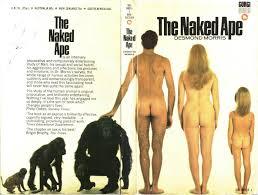 The Naked Ape, by Desmond Morris First, they were nomadic hunter-gatherers, as common as bears. But they learned to hunt and gather in almost every part of the world - in the Europe of the Ice Ages, in the rain forest and deserts of Australia, in Africa, on Siberian tundra, in the far North of Alaska. In doing so, they increased the niche-space of their species. Instead of being limited to a local population in the tropics, or the temperate regions, naked apes spread to every part of the world except the extreme poles.
The Naked Ape, by Desmond Morris First, they were nomadic hunter-gatherers, as common as bears. But they learned to hunt and gather in almost every part of the world - in the Europe of the Ice Ages, in the rain forest and deserts of Australia, in Africa, on Siberian tundra, in the far North of Alaska. In doing so, they increased the niche-space of their species. Instead of being limited to a local population in the tropics, or the temperate regions, naked apes spread to every part of the world except the extreme poles.
But this spreading population was still limited by the resources available to hunter-gatherers. They followed the high-investment breeding strategy of having one or two children at a time, and spending much time rearing them. As with all other animal species, their population increased during good times, when more children were born and survived - but might crash during bad times when fewer mothers were in condition to give birth and more children died. So the world-wide population increased somewhat, but remained relatively stable.
But then, astonishingly, these animals learned to stop hunting and to herd the animals they needed - whether reindeer, or goats or cattle. They maintained the population of their prey-animals by protecting them from other predators and helping them to find food. This meant that the naked apes themselves could confidently expect to raise more children to adulthood because there was a more certain food supply. Their population increased - and increased again, because it was much less affected by bad years.
Moving from hunter-gatherers to herders meant an increase in niche-space: more resources were available. But, as ever, the increase in resources was soon absorbed by the increased population brought about by the unchanged breeding strategy.
Not to worry, though, because herding led on to settled farming, another huge increase in niche-space. Now, not only were the prey animals kept in one place, protected and provided with food, but the neccessary plant foods were too. Food could be produced more efficiently, and also stored more efficiently when it didn't have to be carried with a nomadic group, or hidden in caches.
These were huge changes in life-style for the naked ape - but the breeding strategy remained the same. A great many more naked apes were born to take advantage of the niche-space - but more niche-space was also being created by the emergence of city-states and a whole new way of life.
For one, if you could produce more wealth than your neighbour, you could persuade your neighbour to do most of your work for you, in return for a share of your produce. So different classes came into existence.
Why make your own clothes, shoes and pots when it was more efficient to pay someone else to do it, and pay them in money or kind? Some people found that they were good enough at singing or story-telling to make a living at it.
New technologies - the smelting of metals, stone-masonry, ship-building - produced other niche-spaces, absorbing the growing population and allowing them to make a living. A governing class. A priest class. A warrior class. They were all sub-niche-spaces, all provided livings.
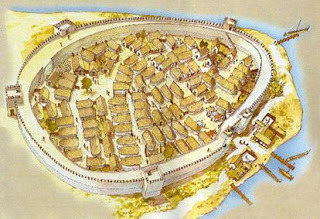 City State - wiki
City State - wiki
Niche Space Runs Out But eventually, as the population grows, there comes pressure on resources. So long as there's enough space in the world to enable more land to be cleared or mined, this isn't a problem. But if there's another growing city-state over there - and another one over there - then the solution is more difficult.
One way of avoiding the problem of shrinking niche-space is to impose a very strict caste or class system. Most societies of Naked Ape have tried this, in some form, at many different times over the centuries. For instance, only males are allowed to do certain jobs, usually high-status jobs, while females have to find a male to support them. Or restrictions may be applied to certain ethnic or religious groups, or simply to 'a lower class' who are deemed 'untouchables' or 'serfs.' This tactic buys time, for a while, but the breeding strategy ensures that the population continues to grow - and, ironically, it's usually among the higher classes where the squeeze of narrowing niche-space is felt first and most painfully, by those children born to affluence who suddenly realise there is no space left for them in the wider, freer niche-space their parents enjoyed.
Another way out of the problem is to trade. You go to those states who are crowding your own, and you offer to exchange surplus goods with them. You can even build ships and cross the seas to trade with foreigners. This, for a while, solves the problem. It creates a source of fresh produce and creates prosperous jobs for many.
But every increase in niche-space means an increase in population - because the breeding strategy rolls on unaltered. Every single person in these growing cities produces as many off-spring as they think they can raise. Up and up goes the population, particuarly among the poorest.
The Poor and Their ChildrenWhy do the poor have more children, even when their more prosperous countrymen crush them into a smaller and smaller niche-space?
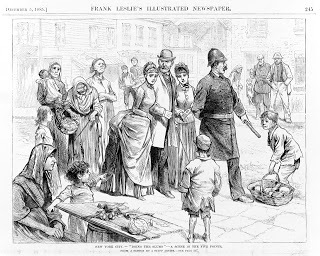 'Slum Tourism' - wikipedia Because if you live, say, on a sheet of cloth spread on a pavement, and your biggest aspiration for your children is that they eat once a day, then children are cheap. They aren't going to cost you much - indeed, it will possibly cost you more, in all sorts of ways, to prevent their birth. Children will also start earning for you in infancy, so where is the incentive to limit their number?
'Slum Tourism' - wikipedia Because if you live, say, on a sheet of cloth spread on a pavement, and your biggest aspiration for your children is that they eat once a day, then children are cheap. They aren't going to cost you much - indeed, it will possibly cost you more, in all sorts of ways, to prevent their birth. Children will also start earning for you in infancy, so where is the incentive to limit their number?
If, however, you are rather better off - if your plans for your children include a nursery, then room of their own in a comfortable house, a crib, a nanny, a bed, good clothes and shoes, three or more meals a day, a good education, toys, books, music-lessons, dance-classes, training in a trade, a car (or horse) on their 18th, a good marriage (with a dowry or big wedding) a house of their own, prosperity and children of their own - well, then each child is going to cost you thousands, even tens of thousands. One way or another, you make sure you have fewer. (In ancient Greece and Rome, the well-off exposed children they didn't want to raise.) It's the well-off who sit down with pencil and paper (or Excel) and work out if they can afford a child. The poor, in this as in almost every other life-situation, just get on with it.
Again, it's about niche-space. The niche inhabited by the poor is narrow. It affords them few choices and, as a result, they have few aspirations. But this narrow niche is cheap. It requires few resources. The people crammed into it are satisfied with little. My aunt, who grew up in a slum, has often told me that, until she won a scholarship to grammar-school and discovered that her classmates had electricity and fridges at home, she'd no idea her family were poor, since everyone else she'd known had been equally poor.
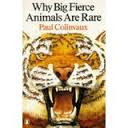 The niche-space occupied by the better-off is wider, and increases with wealth. Indeed, Colinvaux remarks that the richer a naked ape is, the more their life includes aspects of the old hunter-gatherer life: - acres of beautiful countryside as their 'territory', travel, hunting as a pastime, dogs and horses. But although this niche is broad, offering many choices and freedoms, it is very expensive in terms of resources. It can, therefore, be occupied by far fewer than the narrow niches of the poor. The poor are like deer - hundreds to the acre. The rich become more tigerish as they grow richer. They defend their territory too.
The niche-space occupied by the better-off is wider, and increases with wealth. Indeed, Colinvaux remarks that the richer a naked ape is, the more their life includes aspects of the old hunter-gatherer life: - acres of beautiful countryside as their 'territory', travel, hunting as a pastime, dogs and horses. But although this niche is broad, offering many choices and freedoms, it is very expensive in terms of resources. It can, therefore, be occupied by far fewer than the narrow niches of the poor. The poor are like deer - hundreds to the acre. The rich become more tigerish as they grow richer. They defend their territory too.
Revolutions and the Middle-Class Herein also lies the answer to the questions: Why are revolutions always led, not by the oppressed, but by the middle-classes? and Why are so many vicious, murderous political gangs drawn from the nicely brought up and spoken boys and girls of those middle-classes?
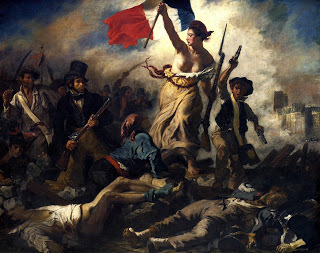 Delacroix - wikipedia The aspiring and prosperous - from the middle to the upper classes - have always had fewer children than the poor and higher aspirations for the few they have. But the more freedom and choice a niche offers, the more resources it uses and therefore, the fewer people it can support. One child will inherit, and you can give younger sons to the military and the church to find them livings. You can marry some daughters off - but still, if you want your children to remain in your social niche, there's a limit to how many you can find space for. So it's these affluent niches - wide in their choices and freedoms, but narrow in terms of numbers they can contain - which feel the pinch first and most keenly when the pressure on resources mounts.
Delacroix - wikipedia The aspiring and prosperous - from the middle to the upper classes - have always had fewer children than the poor and higher aspirations for the few they have. But the more freedom and choice a niche offers, the more resources it uses and therefore, the fewer people it can support. One child will inherit, and you can give younger sons to the military and the church to find them livings. You can marry some daughters off - but still, if you want your children to remain in your social niche, there's a limit to how many you can find space for. So it's these affluent niches - wide in their choices and freedoms, but narrow in terms of numbers they can contain - which feel the pinch first and most keenly when the pressure on resources mounts.
The very wealthy are insulated by their extreme wealth - and they also have the most resources to use, tigerishly, in defence of what they have. The Military, the Church, the Judiciary, Communications, the Means of Production - almost all of it is in their control. Threaten their position and they will close rank - hence the strong swing to the Right we are experiencing in politics now.
The poorest are used to hardship and never expected much anyway. They're grateful to 'have a roof over their head and a loaf on the table.'
But those caught in the middle, those who grew up expecting that their life would include a comfortable house with a big garden, an interesting, rewarding job, the wherewithal to travel and follow interests, whether it be rock-climbing or pottery - what happens when they find that they are going to have to settle for much less than their parents had? When they find that they can't get a job, can't afford a house, or a car or a holiday - or a child?
It understandably comes as a humiliating, painful shock. And why shouldn't it? After all, nothing about the situation is their fault. They didn't choose the time they were born in, or the way they were raised. Most of them have never even heard of niche-space and breeding strategy and, even if they had, couldn't do anything about it.
When Trade Is Not EnoughSo we've seen that you can increase niche-space by trade and by technological advance - because a new technology, whether it's ship-building or smelting metal, or programming computers, creates jobs.
But, in some periods there comes a point when no new technology is coming to rescue the naked apes from their breeding strategy and trade is no longer supplying enough resources or enough profit to support the growing population. What then?
Then it inevitably occurs to the naked ape that if, instead of trading with a particular country, if they just took the country instead, that would be more profitable.
At any given time, there are always several ambitious apes seeking to be top ape, as apes will. If one of these ambitious apes happens to coincide with a squeeze on niche-space - well, then you have an Alexander, an Augustus, a Clive of India, a Napolean, a Hitler, all of them whole-heartedly supported by their tightly-squeezed countrymen, longing for more niche-space - which answers all those questions about war. Hitler even spoke about 'living-room.'
Being a pacifist feels much more comfortable when your niche-space isn't too tight. (And is much more courageous when it is tight and all around you are in jingo-istic, empire-building mood.)
These 'wars of civilisation,' Colinvaux points out, are always a stronger, more technologically advanced state grabbing a weaker (if not geographically smaller), less advanced, less organised country. Whatever high-flown reason is given, whatever excuse is put forward, it is always a straight-forward bullying snatch of land and resources by the stronger state. There has never been an example of, say, a tribe of Bushmen invading and conquering France or Britain. Barbarians took down Rome, yes - but they were, in fact, highly organised and well-equipped barbarians, quite wealthy in their own opinion - just as Genghis Khan's 'barbarians' were at a later period. In each case the 'barbarians' faced large states exhausted by their efforts to find new niche-space; states that had run out of options.
The option of war and colonisation creates niche-space not only by gaining access to resources such as food and materials at less cost - it also creates interesting and generally well-rewarded jobs for the young of the better-off. They become viceroys and governors of the colonies, merchant-traders, spice-growers, tea-planters, even missionaries. The armies needed to enforce colonisation also provide niche-space for 'the sweepings of the gutter.'
But breeding strategy continues to do its stuff and the new niche-space gained at the cost of war is filled up by the increasing population.
Sometimes, it takes a while. The colonisation of Australia and the Americas (and the genocide of the native civilisation,) siphoned off surplus population and relieved pressure for several centuries. 'Go West, young man.' There will never, Colinvaux remarks, be such a pressure-release valve again.
Why was Europe the 'cockpit of war?'Because there were too many nations crammed into one land mass, their populations increasing and aspiring. Every time the pressure of falling resources was felt, another revolution or war was triggered as the prosperous classes felt the pinch and grew angry.
To win big, final victories and establish an Empire lasting hundreds of years, as the Romans did, you have to go against less well-armed and organised opponents with a tactic they cannot withstand. Alexander won his victories with the phalanx. The Romans had the legion and the tortoise.
 Wikipedia: printing press But in Europe was developed a piece of technology that not only created a lot of niche-space, but meant that no war-like state was going to be able to win crushing, final victories in Europe ever again:- the printing-press. Once the printing-press was invented, any new tactic was, within a few years, available to everyone else. Hence the endless round of revolutions and wars in Europe, which had no direction, not north, west, south or east, to send its restless and disappointed young and no way of winning new niche-space by winning a lasting victory over another European state.
Wikipedia: printing press But in Europe was developed a piece of technology that not only created a lot of niche-space, but meant that no war-like state was going to be able to win crushing, final victories in Europe ever again:- the printing-press. Once the printing-press was invented, any new tactic was, within a few years, available to everyone else. Hence the endless round of revolutions and wars in Europe, which had no direction, not north, west, south or east, to send its restless and disappointed young and no way of winning new niche-space by winning a lasting victory over another European state.
This is also why Africa is riven with so many wars now - and why Europe probably will be again.
Oh, but the European Common Market was created, in part, to prevent war in Europe ever happening again. I had little faith in this argument before I read The Fates of Nations. I have none now. All over Europe are nations seething with people whose niche-space has just crashed in on them, crushing them into a place where they don't want to be. Revolution and war will follow.
In the last couple of months, the IRA have started attacks again. Daesh commit atrocities while journalists confess themselves puzzled that the boys and girls who run away to join Daesh are not only 'middle-class' but appear to know little about Islam. Nor, often, it seems, do the people who recruit them.
That's because it's not, at bottom, about religion or politics. It never was. It is, and always was, about niche-space made tight by breeding strategy.
Left-wingers in the UK at the moment are puzzled and despairing at the political swing to the right - by the fact that the 'Nasty Party' keeps being re-elected, despite their proving, again and again, just how nasty they are. Good-hearted people are dismayed by the increasing xenophobia, the increasing tendency to stigmatise and isolate the poor. They are distressed by the push to turn schools into academies which can refuse admission to pupils who, to be blunt, they consider not good enough and by the push to privatise the NHS, which would take us back to my great-grandparents' age, when one of their children died because sending for a doctor would have cost twelve and a half pence. Which they didn't have to spare.
Colinvaux isn't puzzled. The shift to the right, the hardening of class-barriers, is shrinking niche-space in action. As niche-space shrinks those with the widest niche-space move, like tigers, to protect their territory. They harden their attitude, become more callous, more prejudiced and xenophobic, less open to argument or new ideas. They vote to protect their niche-space.
As the niche-space of others contracts, that of the very wealthy becomes ever wider and more comfortable. We'll soon be back to those good old Victorian Values so beloved of the Tories - when servants were plentiful and cheap, when the lower-classes knew their place and Labour was the lowest cost of production.
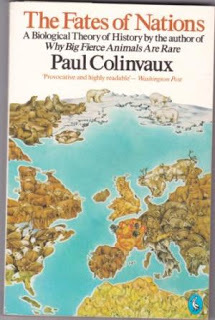
Humans have changed their niche-space again and again but, like all other animals, they have never changed their breeding strategy. They stubbornly continue - as they have throughout history - to have as many children as they think they can raise to adulthood within the niche-space they occupy at the time. It's ruinous, to human society and the planet.
We now not only have as many children as we think we can raise, massively increasing demand on resources year on year on year - but we are now occupied in trying to escape death for longer and longer, in trying to ensure that infertile couples can have children too, and in preserving the lives of those who would have naturally died young. The science that enables us to do these things is a niche-space: it provides an interesting living for many. Its researches enable us to increase the population even faster, and to produce more food to feed that growing population. Which ensures that the population will grow even faster still - because breeding-strategy always ensures that niche-space is filled.
I first read Colinvaux's The Fates of Nations over 20 years ago. It lit up my head then, and it does now. I look around, I watch the news, and see the theories of niche-space and breeding-strategy at work everywhere. Indeed, my family are becoming fed-up with hearing me mutter, "Niche-space," at regular intervals.
The book is fascinating. Not cheerful - in fact, rather depressing - but clarifying. Clarity is often depressing.
It's particuarly uncheering for a left-winger like me; but it's hard to deny the truth behind it. The theory doesn't justify war, cruelty, infanticide and so forth. It simply makes clear the pattern that is expressed through them.
In short, a great book if you want to think. But not if you want to sleep easy.
Find Colinvaux's books here.
Postscript. I wrote and scheduled this post before Britain went to the polling-booths to vote on remaining in or leaving the EU. As I write, I don't know what the result will be. But an MP has already been murdered by a man shouting, 'Britons First!' (Niche-space.)
In The Fates of Nations, Colinvaux tries to predict which nation will start the next big war. It won't be any of the usual suspects, he says. It will be a small, crowded island state which 'lives on other nations' territory.' In other words, imports most of its goods. It will happen because the people of this small island state, especially the 'middling-sort' feel thwarted and angry as their niche-space shrinks and as they grow more bitter and disappointed by the failure of their politicians' solutions. It will be begun, he predicts, either by Japan or Great Britain.
Cheers!
Warning: This blog is much longer than usual, but it reviews a fascinating book.

Why does the human race - supposedly intelligent - keep fighting wars, despite all that has been said against the habit?
Why do empires, such as the Roman and the British, periodically rise and then fall or fade away?
Why do leaders such as Alexander, Napoleon and Hitler periodically arise to lead their people into war - and why do the people willingly, even eagerly, follow them?
Why has Europe been, for centuries, a 'cockpit of war' and revolution?
Can the EU prevent such 'Wars of Civilisation' in the future?
Why is the continent of Africa riven with war?
Why are so many vicious, murderous political gangs - I could say 'IRA' or 'Baader Meinhof' or 'Daesh' - drawn from the nicely brought up and spoken boys and girls of the middle-classes, who, on the face of it, have comfortable lives and little need to fight for 'freedom'?
And why, in every part of the world and at all times, have the poor always had many more children than the rich, despite being able to afford them less? Why does contraception and education make little difference to this trend?
All these many questions, and more, can be answered very simply. Niche-Space and Breeding Strategy.
This theory is argued by Paul Colinvaux in his 'The Fates of Nations.' He was an ecologist, and The Fates of Nations answers all these questions by applying the rules of ecology, not to salmon or brown bears or wildebeeste, but to that other animal, the Naked Ape.
Colinvaux defines 'niche-space' as 'a specific set of capabilities for extracting resources, for surviving hazards and for competing; coupled with a corresponding set of needs.' It describes not only the amount of physical space an animal requires to live naturally and healthily, but also the animals' requirements in terms of climate, type and amount of food, type and size of home or lair and so on.
Some niche-spaces are larger than others. An acre of land can support many hundreds of deer, if there is enough water and vegetation. It gives them all they need.
However, that same lush, well-watered acre would not support a single tiger. As a dedicated carnivore, a tiger needs access to many, many deer to feed itself. Deer run away from tigers and many are too fast to be caught. Also, all deer become skittish when there's a predator about. In Yellowstone, after the reintroduction of wolves, deer stopped standing about, grazing like cows. Even when the wolf-pack was in an different, distant part of the park, the deer continued to move on frequently, snatching a few mouthfuls here and there, but never staying in one place for very long.
So a tiger needs to be able to shift ground frequently, to find more unsuspecting prey. Every single tiger needs a large territory, which it will defend from others.
 As Colinvaux put in in the memorable title of another of his books, this is Why Big Fierce Animals Are Rare. Long before humans became a plague on the earth, before tigers' habitat was remotely threatened, long before they could be efficiently slaughtered for the supposed medicinal value of their bones, even then, tigers were still rare compared to deer or mice or strawberry plants. They were rare because they had a comparatively wide niche-space. Making a living as a tiger demands a lot of resources in terms of space and prey animals.
As Colinvaux put in in the memorable title of another of his books, this is Why Big Fierce Animals Are Rare. Long before humans became a plague on the earth, before tigers' habitat was remotely threatened, long before they could be efficiently slaughtered for the supposed medicinal value of their bones, even then, tigers were still rare compared to deer or mice or strawberry plants. They were rare because they had a comparatively wide niche-space. Making a living as a tiger demands a lot of resources in terms of space and prey animals.Colinvaux calculates that when humans were living their natural, Ice-Age life, as hunter-gatherers, they were about as common as bears. That is, more common than tigers, because bears and humans are omnivorous and will stoop to eating fruit, vegetables and grubs, but a lot rarer than deer or mice.
That's Niche-Space. Then there's Breeding Strategy.
Every species that has ever lived has always had the same breeding strategy: to have as many off-spring as it's possible to raise to adulthood.
For most animals, this is more or less fixed, so much so that naturalists can write of the 'typical' litter or clutch size for a particular species. This is because an animal's niche-space is usually fixed. As Colinvaux puts it, a squirrel, or any other kind of animal, is 'highly tuned to a very specialized profession.' A squirrel cannot decide that, hey, it would rather be a tiger - any more than a tiger can decide that it would like to try out life as a dolphin.
Evolution has therefore roughly fixed the optimum number of off-spring an animal can have. A very good year may result in birds producing a second clutch of eggs or other animals having a second litter, but that's an exception. In a bad year, when the land can't support the numbers, the animals starve and the population falls. The population of predators is linked to that of their prey. A good year for mice and deer means a good year for wolves and foxes - and vice versa.
Evolution has also fixed the approach most species take to child-rearing: low-investment or high-investment. Low investment species, such as salmon, spawn and fertilise hundreds of eggs at a time. Almost all of them will be eaten, either as eggs or fry. One or two might survive and that's all that matters. The salmon might have made an almighty effort to reach its spawning place but once the eggs are laid, it troubles itself no further about its off-spring.
High-investment species, such as bears, cats and naked apes have one or two off-spring at a time, and they invest a lot of time and effort in feeding and training them. It's a high-risk strategy because, in a bad year, the off-spring might die - or be killed to ensure the survival of older off-spring or the parents. Some animals are known to kill and eat their young if faced with a threat to their own survival. Colinvaux argues that early humans almost certainly regulated their population not only by leaving granny on the ice-flow, but by leaving junior with her. Historically, we know that people frequently abandoned children they did not think they could afford to raise.
Changing Niche SpaceAnimals can't change their niche-space - not by themselves, anyway. Some have become domesticated, some, such as urban foxes, have adapted to living alongside humans, but that came about as a result of human actions
The Naked Ape, however, learned to change its niche-space, and has done so repeatedly.
 The Naked Ape, by Desmond Morris First, they were nomadic hunter-gatherers, as common as bears. But they learned to hunt and gather in almost every part of the world - in the Europe of the Ice Ages, in the rain forest and deserts of Australia, in Africa, on Siberian tundra, in the far North of Alaska. In doing so, they increased the niche-space of their species. Instead of being limited to a local population in the tropics, or the temperate regions, naked apes spread to every part of the world except the extreme poles.
The Naked Ape, by Desmond Morris First, they were nomadic hunter-gatherers, as common as bears. But they learned to hunt and gather in almost every part of the world - in the Europe of the Ice Ages, in the rain forest and deserts of Australia, in Africa, on Siberian tundra, in the far North of Alaska. In doing so, they increased the niche-space of their species. Instead of being limited to a local population in the tropics, or the temperate regions, naked apes spread to every part of the world except the extreme poles.But this spreading population was still limited by the resources available to hunter-gatherers. They followed the high-investment breeding strategy of having one or two children at a time, and spending much time rearing them. As with all other animal species, their population increased during good times, when more children were born and survived - but might crash during bad times when fewer mothers were in condition to give birth and more children died. So the world-wide population increased somewhat, but remained relatively stable.
But then, astonishingly, these animals learned to stop hunting and to herd the animals they needed - whether reindeer, or goats or cattle. They maintained the population of their prey-animals by protecting them from other predators and helping them to find food. This meant that the naked apes themselves could confidently expect to raise more children to adulthood because there was a more certain food supply. Their population increased - and increased again, because it was much less affected by bad years.
Moving from hunter-gatherers to herders meant an increase in niche-space: more resources were available. But, as ever, the increase in resources was soon absorbed by the increased population brought about by the unchanged breeding strategy.
Not to worry, though, because herding led on to settled farming, another huge increase in niche-space. Now, not only were the prey animals kept in one place, protected and provided with food, but the neccessary plant foods were too. Food could be produced more efficiently, and also stored more efficiently when it didn't have to be carried with a nomadic group, or hidden in caches.
These were huge changes in life-style for the naked ape - but the breeding strategy remained the same. A great many more naked apes were born to take advantage of the niche-space - but more niche-space was also being created by the emergence of city-states and a whole new way of life.
For one, if you could produce more wealth than your neighbour, you could persuade your neighbour to do most of your work for you, in return for a share of your produce. So different classes came into existence.
Why make your own clothes, shoes and pots when it was more efficient to pay someone else to do it, and pay them in money or kind? Some people found that they were good enough at singing or story-telling to make a living at it.
New technologies - the smelting of metals, stone-masonry, ship-building - produced other niche-spaces, absorbing the growing population and allowing them to make a living. A governing class. A priest class. A warrior class. They were all sub-niche-spaces, all provided livings.
 City State - wiki
City State - wikiNiche Space Runs Out But eventually, as the population grows, there comes pressure on resources. So long as there's enough space in the world to enable more land to be cleared or mined, this isn't a problem. But if there's another growing city-state over there - and another one over there - then the solution is more difficult.
One way of avoiding the problem of shrinking niche-space is to impose a very strict caste or class system. Most societies of Naked Ape have tried this, in some form, at many different times over the centuries. For instance, only males are allowed to do certain jobs, usually high-status jobs, while females have to find a male to support them. Or restrictions may be applied to certain ethnic or religious groups, or simply to 'a lower class' who are deemed 'untouchables' or 'serfs.' This tactic buys time, for a while, but the breeding strategy ensures that the population continues to grow - and, ironically, it's usually among the higher classes where the squeeze of narrowing niche-space is felt first and most painfully, by those children born to affluence who suddenly realise there is no space left for them in the wider, freer niche-space their parents enjoyed.
Another way out of the problem is to trade. You go to those states who are crowding your own, and you offer to exchange surplus goods with them. You can even build ships and cross the seas to trade with foreigners. This, for a while, solves the problem. It creates a source of fresh produce and creates prosperous jobs for many.
But every increase in niche-space means an increase in population - because the breeding strategy rolls on unaltered. Every single person in these growing cities produces as many off-spring as they think they can raise. Up and up goes the population, particuarly among the poorest.
The Poor and Their ChildrenWhy do the poor have more children, even when their more prosperous countrymen crush them into a smaller and smaller niche-space?
 'Slum Tourism' - wikipedia Because if you live, say, on a sheet of cloth spread on a pavement, and your biggest aspiration for your children is that they eat once a day, then children are cheap. They aren't going to cost you much - indeed, it will possibly cost you more, in all sorts of ways, to prevent their birth. Children will also start earning for you in infancy, so where is the incentive to limit their number?
'Slum Tourism' - wikipedia Because if you live, say, on a sheet of cloth spread on a pavement, and your biggest aspiration for your children is that they eat once a day, then children are cheap. They aren't going to cost you much - indeed, it will possibly cost you more, in all sorts of ways, to prevent their birth. Children will also start earning for you in infancy, so where is the incentive to limit their number? If, however, you are rather better off - if your plans for your children include a nursery, then room of their own in a comfortable house, a crib, a nanny, a bed, good clothes and shoes, three or more meals a day, a good education, toys, books, music-lessons, dance-classes, training in a trade, a car (or horse) on their 18th, a good marriage (with a dowry or big wedding) a house of their own, prosperity and children of their own - well, then each child is going to cost you thousands, even tens of thousands. One way or another, you make sure you have fewer. (In ancient Greece and Rome, the well-off exposed children they didn't want to raise.) It's the well-off who sit down with pencil and paper (or Excel) and work out if they can afford a child. The poor, in this as in almost every other life-situation, just get on with it.
Again, it's about niche-space. The niche inhabited by the poor is narrow. It affords them few choices and, as a result, they have few aspirations. But this narrow niche is cheap. It requires few resources. The people crammed into it are satisfied with little. My aunt, who grew up in a slum, has often told me that, until she won a scholarship to grammar-school and discovered that her classmates had electricity and fridges at home, she'd no idea her family were poor, since everyone else she'd known had been equally poor.
 The niche-space occupied by the better-off is wider, and increases with wealth. Indeed, Colinvaux remarks that the richer a naked ape is, the more their life includes aspects of the old hunter-gatherer life: - acres of beautiful countryside as their 'territory', travel, hunting as a pastime, dogs and horses. But although this niche is broad, offering many choices and freedoms, it is very expensive in terms of resources. It can, therefore, be occupied by far fewer than the narrow niches of the poor. The poor are like deer - hundreds to the acre. The rich become more tigerish as they grow richer. They defend their territory too.
The niche-space occupied by the better-off is wider, and increases with wealth. Indeed, Colinvaux remarks that the richer a naked ape is, the more their life includes aspects of the old hunter-gatherer life: - acres of beautiful countryside as their 'territory', travel, hunting as a pastime, dogs and horses. But although this niche is broad, offering many choices and freedoms, it is very expensive in terms of resources. It can, therefore, be occupied by far fewer than the narrow niches of the poor. The poor are like deer - hundreds to the acre. The rich become more tigerish as they grow richer. They defend their territory too.Revolutions and the Middle-Class Herein also lies the answer to the questions: Why are revolutions always led, not by the oppressed, but by the middle-classes? and Why are so many vicious, murderous political gangs drawn from the nicely brought up and spoken boys and girls of those middle-classes?
 Delacroix - wikipedia The aspiring and prosperous - from the middle to the upper classes - have always had fewer children than the poor and higher aspirations for the few they have. But the more freedom and choice a niche offers, the more resources it uses and therefore, the fewer people it can support. One child will inherit, and you can give younger sons to the military and the church to find them livings. You can marry some daughters off - but still, if you want your children to remain in your social niche, there's a limit to how many you can find space for. So it's these affluent niches - wide in their choices and freedoms, but narrow in terms of numbers they can contain - which feel the pinch first and most keenly when the pressure on resources mounts.
Delacroix - wikipedia The aspiring and prosperous - from the middle to the upper classes - have always had fewer children than the poor and higher aspirations for the few they have. But the more freedom and choice a niche offers, the more resources it uses and therefore, the fewer people it can support. One child will inherit, and you can give younger sons to the military and the church to find them livings. You can marry some daughters off - but still, if you want your children to remain in your social niche, there's a limit to how many you can find space for. So it's these affluent niches - wide in their choices and freedoms, but narrow in terms of numbers they can contain - which feel the pinch first and most keenly when the pressure on resources mounts.The very wealthy are insulated by their extreme wealth - and they also have the most resources to use, tigerishly, in defence of what they have. The Military, the Church, the Judiciary, Communications, the Means of Production - almost all of it is in their control. Threaten their position and they will close rank - hence the strong swing to the Right we are experiencing in politics now.
The poorest are used to hardship and never expected much anyway. They're grateful to 'have a roof over their head and a loaf on the table.'
But those caught in the middle, those who grew up expecting that their life would include a comfortable house with a big garden, an interesting, rewarding job, the wherewithal to travel and follow interests, whether it be rock-climbing or pottery - what happens when they find that they are going to have to settle for much less than their parents had? When they find that they can't get a job, can't afford a house, or a car or a holiday - or a child?
It understandably comes as a humiliating, painful shock. And why shouldn't it? After all, nothing about the situation is their fault. They didn't choose the time they were born in, or the way they were raised. Most of them have never even heard of niche-space and breeding strategy and, even if they had, couldn't do anything about it.
When Trade Is Not EnoughSo we've seen that you can increase niche-space by trade and by technological advance - because a new technology, whether it's ship-building or smelting metal, or programming computers, creates jobs.
But, in some periods there comes a point when no new technology is coming to rescue the naked apes from their breeding strategy and trade is no longer supplying enough resources or enough profit to support the growing population. What then?
Then it inevitably occurs to the naked ape that if, instead of trading with a particular country, if they just took the country instead, that would be more profitable.
At any given time, there are always several ambitious apes seeking to be top ape, as apes will. If one of these ambitious apes happens to coincide with a squeeze on niche-space - well, then you have an Alexander, an Augustus, a Clive of India, a Napolean, a Hitler, all of them whole-heartedly supported by their tightly-squeezed countrymen, longing for more niche-space - which answers all those questions about war. Hitler even spoke about 'living-room.'
Being a pacifist feels much more comfortable when your niche-space isn't too tight. (And is much more courageous when it is tight and all around you are in jingo-istic, empire-building mood.)
These 'wars of civilisation,' Colinvaux points out, are always a stronger, more technologically advanced state grabbing a weaker (if not geographically smaller), less advanced, less organised country. Whatever high-flown reason is given, whatever excuse is put forward, it is always a straight-forward bullying snatch of land and resources by the stronger state. There has never been an example of, say, a tribe of Bushmen invading and conquering France or Britain. Barbarians took down Rome, yes - but they were, in fact, highly organised and well-equipped barbarians, quite wealthy in their own opinion - just as Genghis Khan's 'barbarians' were at a later period. In each case the 'barbarians' faced large states exhausted by their efforts to find new niche-space; states that had run out of options.
The option of war and colonisation creates niche-space not only by gaining access to resources such as food and materials at less cost - it also creates interesting and generally well-rewarded jobs for the young of the better-off. They become viceroys and governors of the colonies, merchant-traders, spice-growers, tea-planters, even missionaries. The armies needed to enforce colonisation also provide niche-space for 'the sweepings of the gutter.'
But breeding strategy continues to do its stuff and the new niche-space gained at the cost of war is filled up by the increasing population.
Sometimes, it takes a while. The colonisation of Australia and the Americas (and the genocide of the native civilisation,) siphoned off surplus population and relieved pressure for several centuries. 'Go West, young man.' There will never, Colinvaux remarks, be such a pressure-release valve again.
Why was Europe the 'cockpit of war?'Because there were too many nations crammed into one land mass, their populations increasing and aspiring. Every time the pressure of falling resources was felt, another revolution or war was triggered as the prosperous classes felt the pinch and grew angry.
To win big, final victories and establish an Empire lasting hundreds of years, as the Romans did, you have to go against less well-armed and organised opponents with a tactic they cannot withstand. Alexander won his victories with the phalanx. The Romans had the legion and the tortoise.
 Wikipedia: printing press But in Europe was developed a piece of technology that not only created a lot of niche-space, but meant that no war-like state was going to be able to win crushing, final victories in Europe ever again:- the printing-press. Once the printing-press was invented, any new tactic was, within a few years, available to everyone else. Hence the endless round of revolutions and wars in Europe, which had no direction, not north, west, south or east, to send its restless and disappointed young and no way of winning new niche-space by winning a lasting victory over another European state.
Wikipedia: printing press But in Europe was developed a piece of technology that not only created a lot of niche-space, but meant that no war-like state was going to be able to win crushing, final victories in Europe ever again:- the printing-press. Once the printing-press was invented, any new tactic was, within a few years, available to everyone else. Hence the endless round of revolutions and wars in Europe, which had no direction, not north, west, south or east, to send its restless and disappointed young and no way of winning new niche-space by winning a lasting victory over another European state.This is also why Africa is riven with so many wars now - and why Europe probably will be again.
Oh, but the European Common Market was created, in part, to prevent war in Europe ever happening again. I had little faith in this argument before I read The Fates of Nations. I have none now. All over Europe are nations seething with people whose niche-space has just crashed in on them, crushing them into a place where they don't want to be. Revolution and war will follow.
In the last couple of months, the IRA have started attacks again. Daesh commit atrocities while journalists confess themselves puzzled that the boys and girls who run away to join Daesh are not only 'middle-class' but appear to know little about Islam. Nor, often, it seems, do the people who recruit them.
That's because it's not, at bottom, about religion or politics. It never was. It is, and always was, about niche-space made tight by breeding strategy.
Left-wingers in the UK at the moment are puzzled and despairing at the political swing to the right - by the fact that the 'Nasty Party' keeps being re-elected, despite their proving, again and again, just how nasty they are. Good-hearted people are dismayed by the increasing xenophobia, the increasing tendency to stigmatise and isolate the poor. They are distressed by the push to turn schools into academies which can refuse admission to pupils who, to be blunt, they consider not good enough and by the push to privatise the NHS, which would take us back to my great-grandparents' age, when one of their children died because sending for a doctor would have cost twelve and a half pence. Which they didn't have to spare.
Colinvaux isn't puzzled. The shift to the right, the hardening of class-barriers, is shrinking niche-space in action. As niche-space shrinks those with the widest niche-space move, like tigers, to protect their territory. They harden their attitude, become more callous, more prejudiced and xenophobic, less open to argument or new ideas. They vote to protect their niche-space.
As the niche-space of others contracts, that of the very wealthy becomes ever wider and more comfortable. We'll soon be back to those good old Victorian Values so beloved of the Tories - when servants were plentiful and cheap, when the lower-classes knew their place and Labour was the lowest cost of production.

Humans have changed their niche-space again and again but, like all other animals, they have never changed their breeding strategy. They stubbornly continue - as they have throughout history - to have as many children as they think they can raise to adulthood within the niche-space they occupy at the time. It's ruinous, to human society and the planet.
We now not only have as many children as we think we can raise, massively increasing demand on resources year on year on year - but we are now occupied in trying to escape death for longer and longer, in trying to ensure that infertile couples can have children too, and in preserving the lives of those who would have naturally died young. The science that enables us to do these things is a niche-space: it provides an interesting living for many. Its researches enable us to increase the population even faster, and to produce more food to feed that growing population. Which ensures that the population will grow even faster still - because breeding-strategy always ensures that niche-space is filled.
I first read Colinvaux's The Fates of Nations over 20 years ago. It lit up my head then, and it does now. I look around, I watch the news, and see the theories of niche-space and breeding-strategy at work everywhere. Indeed, my family are becoming fed-up with hearing me mutter, "Niche-space," at regular intervals.
The book is fascinating. Not cheerful - in fact, rather depressing - but clarifying. Clarity is often depressing.
It's particuarly uncheering for a left-winger like me; but it's hard to deny the truth behind it. The theory doesn't justify war, cruelty, infanticide and so forth. It simply makes clear the pattern that is expressed through them.
In short, a great book if you want to think. But not if you want to sleep easy.
Find Colinvaux's books here.
Postscript. I wrote and scheduled this post before Britain went to the polling-booths to vote on remaining in or leaving the EU. As I write, I don't know what the result will be. But an MP has already been murdered by a man shouting, 'Britons First!' (Niche-space.)
In The Fates of Nations, Colinvaux tries to predict which nation will start the next big war. It won't be any of the usual suspects, he says. It will be a small, crowded island state which 'lives on other nations' territory.' In other words, imports most of its goods. It will happen because the people of this small island state, especially the 'middling-sort' feel thwarted and angry as their niche-space shrinks and as they grow more bitter and disappointed by the failure of their politicians' solutions. It will be begun, he predicts, either by Japan or Great Britain.
Cheers!
Published on June 24, 2016 16:00
June 3, 2016
Stick Island
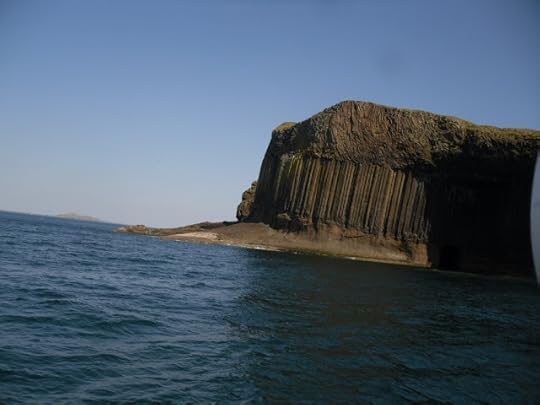
On our latest trip to Mull, we did what tourists to Mull have been doing for over 300 years - we paid locals with a boat to take us out to the island of Staffa.
I'd heard of Staffa, of course. I was raised by a man fascinated by geology, for one thing. I knew that Mendelssohn had been so gob-smacked by it that he wrote 'Fingal's Cave' and the Hebrides Overture. I was keen to go and see it.
But you know what they say about film and photographs never doing justice to a place? That's true of Staffa, cubed. When the boat came alongside the island, under the cliffs - well, I damn near wrote an overture.
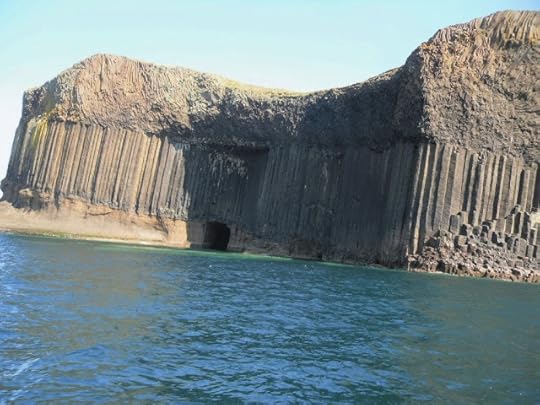
None of these photos, let me make it clear, even begin to do justice to this amazing, numinous place.
It has no safe anchorage. We went ashore, but were only able to because the weather was extremely good and the sea calm. The skipper told us that if the sea is at all choppy, it's impossible to land.
The name of the island is Norse. The 'a' at the end is common in Norse and Saxon place-names. The 'y' at the end of Ely is the same word. Barra, Ulva, Canna - the 'a' at the end of them all means 'island.'
The 'Staff' part can be translated in various ways, but it's come down to us as the word 'staff' or 'stave' - so the boat's skipper wasn't wrong when he translated it as 'Stick Island.' Others translate it as 'pillar' and say the Vikings were reminded of the wooden pillars that supported their houses.
Imagine being a viking, though, and passing this place, this strange concoction of stone rising straight out of the sea, unlike any other place on earth. Why did the gods create it?
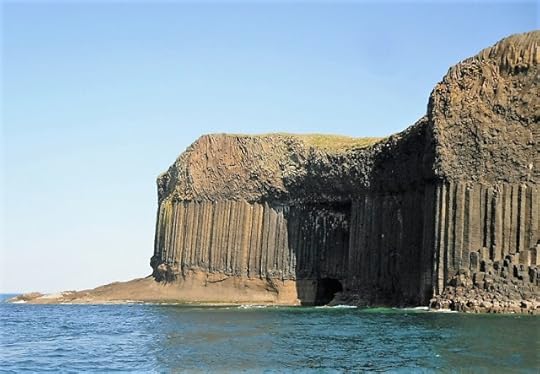
There are three layers to Staffa. There's the smooth, beige-brown rock at the bottom. That's volcanic lava, or tuff. It's volcanic ash, consolidated into rock.
The second layer, those spectacular sticks, is black basalt - a great, thick layer of black basalt - which has cooled slowly. This slow cooling caused it to contract and take on this crystalline structure of hexagonal columns.
Above the columns is a sort of wild top-knot of solid rock. That's not turf or grass you're looking at, but basalt.
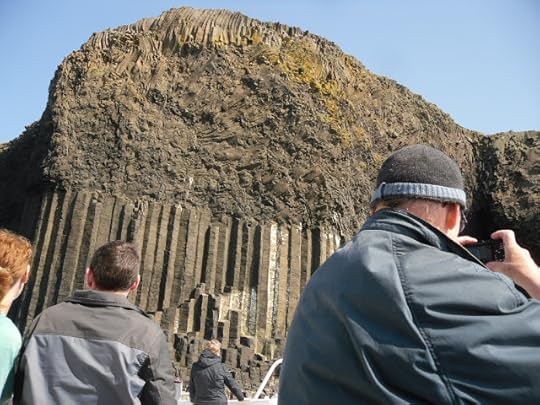 Coming in to the jetty
Coming in to the jettyPresumably, this basalt cooled much faster and didn't crystallise. Instead there's this wild tangle of half-formed columns and dabs and dobs and rocks that looks as if it's been frothed up with a whisk. It bulges in places like the top of a muffin, but it's solid basalt.
If you're reminded of the Giant's Causeway, that's not surprising. Staffa was produced by the same eruption that produced the Causeway and there are similar, but smaller, pillared cliffs all over Mull, often producing an oddly striped, humbug effect on mountainsides.
According to legend, an Irish giant built the Causeway, so he could cross the Irish Sea and beat up a Scottish giant on the other side. It turned out, thought, that the Scots giant was much bigger and fiercer than expected, and so the Irish giant tore up his own causeway in a panic, to prevent the Scots giant reaching him. Staffa is all that's left of the Scottish end.
I can believe it. Lots of people have made that mistake when tangling with Scots. Best leave them alone and never, ever poke them sticks.
Staffa has a tiny wooden jetty against one cliff, where the boat tied up. I don't like to think about who built this jetty or how they managed it. (Where did they stand? Where did they put down their tools?)
From the jetty a metal staircase goes straight up the cliff, almost vertically. Occasionally, it uses the flat tops of basalt columns in place of steps. I had to almost run up these steps because I was first out of the boat and had to keep ahead of everyone else. I reached the top more dead than alive - to be greeted by a massed choir of skylarks, which revived me.
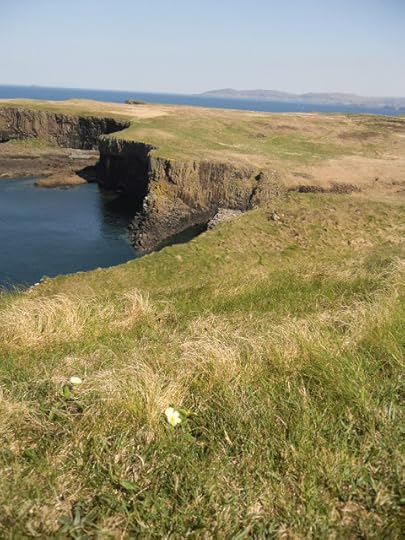 A primrose on Staffa
A primrose on StaffaI think that's Rhum on the horizon.
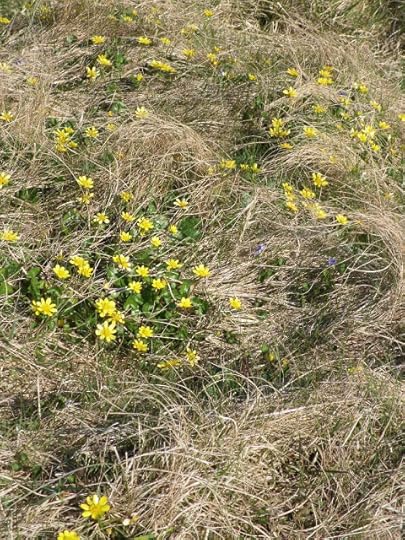 Celendine and violets - I leave you to imagine the sky-larks singing above.
Celendine and violets - I leave you to imagine the sky-larks singing above.I was promised puffins, but the puffins saw us coming and $%"* off into the sea. They must get fed up of tourists. There were some skuas bullying peewits.The skylarks avoided all that by staying in the upper atmosphere and carpet-bombing with song.
The island is now owned by the National Trust but people did once live on it. I can hardly believe this, but there were the remains of fields to be seen and when Sir Joseph Banks visited in 1772, he stayed at the only house on the island, and caught lice. The single family who farmed on Staffa lived on oats, potatoes and the milk and meat of their few grazing animals. By 1800, 'terrified of the winter storms,' they'd given up and I don't blame them.
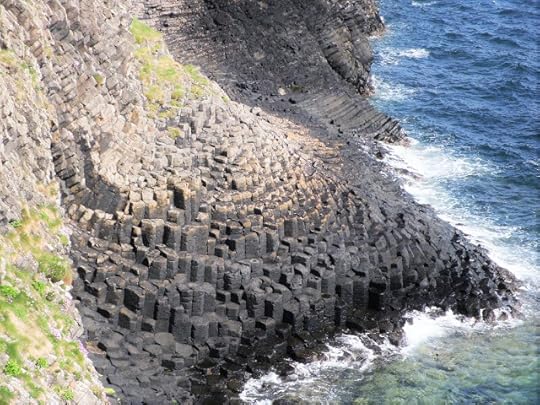 Staffa's cliffs
Staffa's cliffsWe had an hour on the island, which is about a kilometre or half-mile long and half that wide. What must it have been like to live, perched up on top of that rock, with no company other than your immediate family? - We were lucky, we could enjoy it for an hour and then leave. We scrambled back down that dizzy staircase into the boat. As the boat turned back for Mull and Iona, we passed Am Buachaille, The Herdsman.
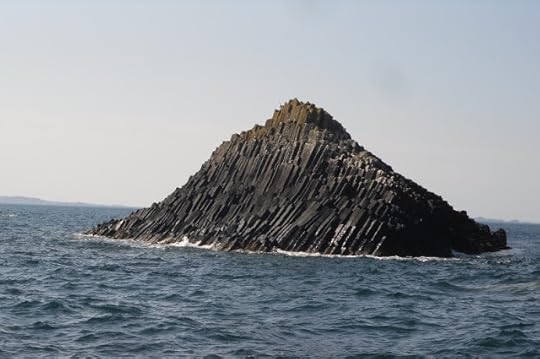
If you squint at this shot, below, you may be able to see some puffins scattered about. I am told they are there. I can't see them.
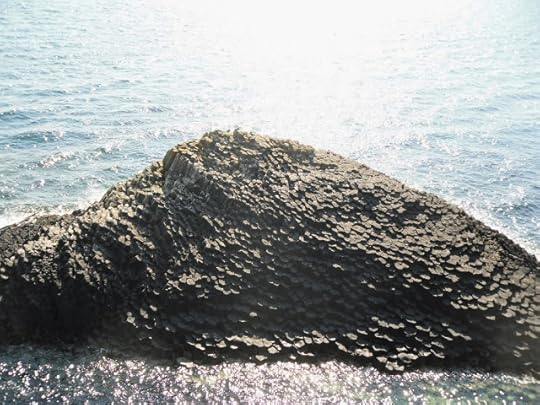
I listened to Mendelssohn's 'Fingal's Cave' when I got back to civilisation. I don't think he did the place justice any more than my photos do.
It was an exhilarating trip but saddening too, because I kept wishing my Dad had been there. He would have known about all the geology and all the birds and plants too. He would have been fit to be tied. We would have had to set traps to get him back on the boat. So, this blog's for Dad.
Published on June 03, 2016 16:00
May 20, 2016
"There's A High Over Scandinavia..."

That's me and Davy, leaning on the quayside at Oban as the sun sets over the bay and the mountains of Mull. It is, honest. Oh well, okay then, it isn't. It's a random young couple who happened to get between me and my camera.
Davy, with his usual weather eye, announced that there was a high over Scandinavia and the weather was going to be unusually good in the Western Isles. So we hurriedly packed, dashed up the motorways early on Sunday morning and spent the evening in Oban.
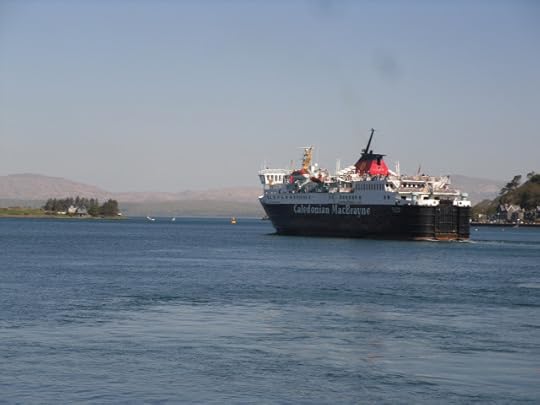
The next morning we took one of the good old Callie-Macs out to Craignure on Mull.
The crossing only takes 45 minutes. As we neared Craignure, we passed Castle Duart.
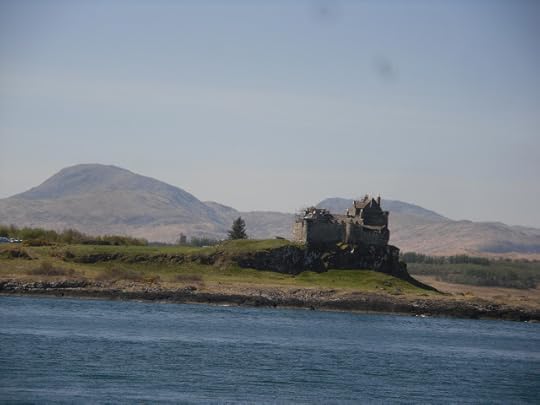
On previous visits to Mull we've investigated Grass Point, where the drovers used to bring their cattle, to ship them over to Kerrara and the mainland; and we've driven down the Ross of Mull to catch the ferry over to Iona. But, on this trip, Davy was interested in seeing the beaches on the Ross of Mull. He'd picked up, from somewhere, that they were reckoned to be 'the finest beaches in the UK.'
I'll say this much: they're not at all bad.
An equally fine beach is on the North of the island, at Calgary. It was all pure white sand, empty blue sky and a sea of a pale blue impossible to describe. Icy cold, though. The sea, that is. The beach was hot.
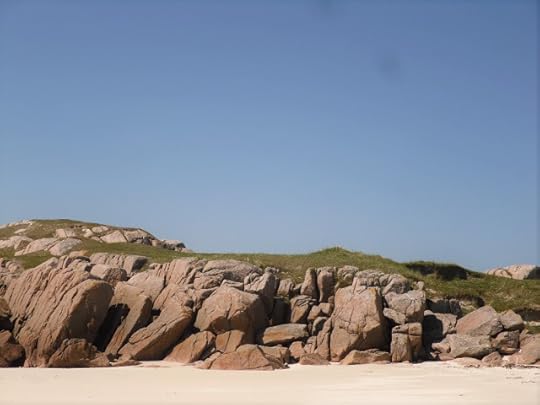 This isn't Calgary - it's one of the Ross of Mull beaches, because my camera's battery had run out by the time we got to Calgary and I somehow managed to forget all electronics. I suspect it was a kind of accidentally-on-purpose sort of forgetfulness.
This isn't Calgary - it's one of the Ross of Mull beaches, because my camera's battery had run out by the time we got to Calgary and I somehow managed to forget all electronics. I suspect it was a kind of accidentally-on-purpose sort of forgetfulness.Calgary in Canada, by the way, is named after Calgary on Mull. A chief of mounties, apparently, used to spend his holidays at Calgary on Mull, and when a name was needed for a new fort in Canada, he suggested 'Calgary.' The little village on Mull's name is really Gaelic: Cala ghearraidh, or beach of the meadow pasture.

The amazing pink rock you find on Iona and Mull.
We stayed at the Argyll Arms in the village of Bunessan. It could not have been better. The road ran right past the pub's door but was hardly busy. On the other end of the narrow road was a bay, with a view out to Staffa. The staff were friendly, the room comfortable and the food good.
Almost all the roads on Mull are single-lane, with passing-places. Driving them is a strain. You have to be constantly watching for vehicles miles ahead and calculating whether or not to pull into the passing-place nearest to you. There are always plenty of drivers who seem incapable of grasping the idea of passing-places and drive right up to your car's nose and impatiently wave at you, to tell you to reverse. They do this, even when there is a passing-place directly behind them which they have driven right past. They think you should reverse around a blind bend with rocks to one side and a drop into a loch on the other rather than they reverse a couple of metres in a straight line.
Amazingly, when a police-car is on the road, all the drivers suddenly seem to understand passing-places.
But not the eagle-watchers who park their cars in passing-places and set up telescopes on tripods, to keep watch on some distant peak.
Davy and I saw eagles. We had walked up one of the island's roads less travelled, and Davy pointed and said, "What's that?" I looked and, gentle readers, honestly thought I saw a glider heading towards us. (My eyesight is not the best.) "Eagles," Davy said. I suppose if we'd had binoculars, we could have told whether they were golden eagles or sea-eagles, but eagles they certainly were. Too ruddy big to be anything else.
But the driving. To reach Oban, Davy drove 300 miles, with only a couple of short breaks. He said that was easier, and less strain, than driving the 50 miles from Bunnessan to Calgary.
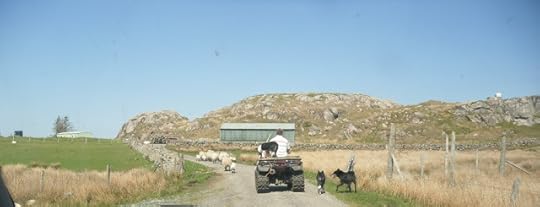 A man with sense enough to bring co-drivers.
A man with sense enough to bring co-drivers.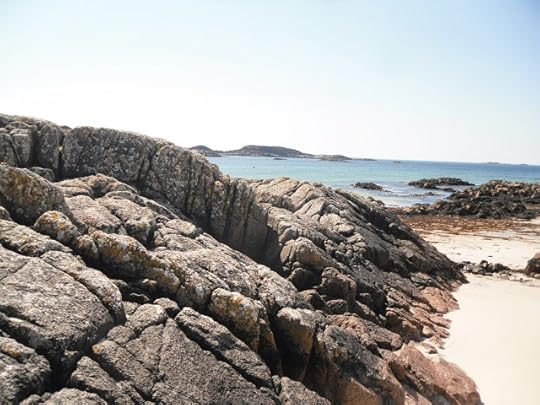
I loved our time getting sun-burned in the Hebrides but, for me, the highlight was a boat-trip to island of Staffa.
I shall save that for another blog.
Published on May 20, 2016 16:00
May 6, 2016
The Sterkarms Spake Like Th'Owd Uns
There was a Black Country man who was famous for his inventive
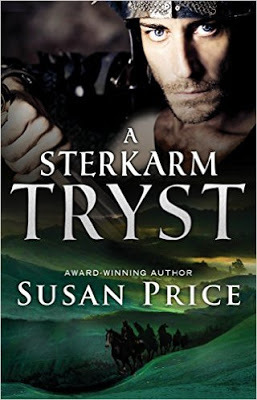 A Sterkarm Tryst by Susan Pricecursing. He could curse for half an hour without drawing breath or repeating himself.
A Sterkarm Tryst by Susan Pricecursing. He could curse for half an hour without drawing breath or repeating himself.
One day he misjudged his aim and gave his thumb a good wallop with his hammer. His workmates paused in their own work and waited with interest. He said, "Oh - faddle!"
His workmates stared. Then one said,
"Tha coo-ert cuss as tha couldst cuss, cost?"
This tongue-twister is an old Black Country story, handed down to me. An heirloom story. The final line is, of course, in Black Country dialect and translates as:
"Thou canst not curse as thou couldst curse, canst thou?"
In translation, it becomes quite Shakespearean. As, of course, it is, since the Black Country dialect, like many other despised English dialects, preserves a lot of older English.
What has this to do with the Sterkarms?
Well, one of the things I've been doing as I've rewritten the Sterkarms over the past year, is to make the Sterkarm's speech more archaic. So I've been grappling with one of the big, perennial problems of writing historical fiction. How do you represent the speech of historical characters?
One school of thought is that you have your characters speak in modern English because the people of the past didn't think of themselves as being 'historical.' They were right up to the minute fashionistas, and they spoke right-up-to-the-minute Latin, or Aramaic, or Anglo-Norman or whatever.
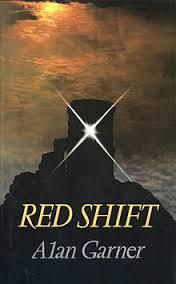 Red Shift by Alan Garner I have a lot of sympathy with that point of view. It was handled superbly in Alan Garner's Red Shift, where one section opens with a conversation between, at first glance, American GIs during the Vietnam War. Only gradually do we realise that they are, in fact, Roman legionaries stranded 'behind the lines' in darkest Celtic Britain.
Red Shift by Alan Garner I have a lot of sympathy with that point of view. It was handled superbly in Alan Garner's Red Shift, where one section opens with a conversation between, at first glance, American GIs during the Vietnam War. Only gradually do we realise that they are, in fact, Roman legionaries stranded 'behind the lines' in darkest Celtic Britain.
After all, the legionaires would have had their own slang, the equivalent of that used by soldiers in later wars. I read somewhere that a lot of our 'classical' Latin is, in fact, slang, that 'caput' actually means, not 'head' but the stopper for a jar. How true this is, I can't say, being no linguist, but it's an interesting idea. The slang of one period becomes the revered classical prose of another. At sometime in the future, 'Hey dude, wassup?' will be heard or read as, 'Dear sir, respectful greetings.'
So I could have made the Sterkarms talk in modern English - except that, in these books, 21st Century characters and 16th Century characters are together in the same time and space, via a time-machine.
I used to love the old SF series, The Time Tunnel. I've always loved the fantasy of being able to visit other times and experience what life was like then. But even as a child, it irritated me that wherever our time-travellers stepped out of their machine - whether it was Ancient Greece or Revolutionary France - they could instantly understand the locals, and the locals them. Perhaps the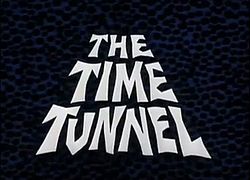 From Wikipediaseries came up with some explanation, similar to Douglas Adam's brilliant 'babel fish,' but if it did, I missed it.
From Wikipediaseries came up with some explanation, similar to Douglas Adam's brilliant 'babel fish,' but if it did, I missed it.
I was determined not to make that mistake when I wrote the Sterkarms, and made it very clear that the Sterkarm's speech is not immediately understandable to their 21st Century visitors, nor vice-versa.
Then I wrote the third book, A Sterkarm Tryst. Most of the action takes place in the 16th Century, but there are plenty of 21st Century people (or 'Elves') milling around there. Or then. I needed to make the distinction between the Sterkarm's speech and the 'Elves'' speech clearer. And if I was going to do that in the third book, then the first two should match. So I rewrote them.
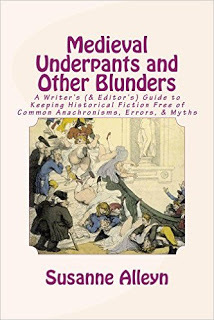 In 'Medieval Underpants and Other Blunders' Susanne Alleyn warns historical writers against attempting 'theeing and thouing.' It is not as simple, she rightly says, as replacing 'you' with 'thou' or 'thee.' And 'thou' and 'thee' aren't interchangeable.
In 'Medieval Underpants and Other Blunders' Susanne Alleyn warns historical writers against attempting 'theeing and thouing.' It is not as simple, she rightly says, as replacing 'you' with 'thou' or 'thee.' And 'thou' and 'thee' aren't interchangeable.
She's quite right. The distinction between 'you' and 'thou' is one reason I wanted to use it, because it's a distinction between formal and informal speech which has vanished from modern English, but was very much a part of the Sterkarms' world.
'Thou' and 'thee' could be used when speaking affectionately to close friends or family, which is why it has become associated with lovers' rhymes, but also when speaking to social inferiors. The meaning here would depend on context. Its use could say, "I know you and trust you well, I regard you as one of my family." Or it could say, "You are so inferior to me that I don't need to bother being polite."
'You' was used to superiors and to strangers who seemed to be of equal or superior status. As you came to know someone and were friendlier, a point was eventually reached where one person, usually the older, asked, "Shall we be 'thou' to one another?"
'You' could also be used in situations where you might actually know the person you were speaking to very well, but wanted to emphasise formality - for instance, to transpose this into today's world, two teachers who were actually good friends might address each other as 'you' in front of a class.
And 'you' could also be used as a weapon against friends, family and lovers. A sudden switch from 'thou' to 'you' signalled that not all was well and the speaker had taken it up the nose.
Indeed, I'm quite sorry that we've lost the you/thou distinction.
I still haven't explained what has all this to do with, 'Thou coo-ert cuss as tha couldst cuss, cost?'
It's simply this: I like to feel I'm standing on firm ground when I attempt something like this. How to avoid the quagmires of using 'thou' when it should be 'thee'? How to feel confident when writing it? I think a loss of confidence in a writer always shows up in the prose.
Well, my firm ground is simply this: I'm Black Country born and bred. I grew up using such words as 'malkin' (simpleton) and 'gleed' (hot coal) and pronouncing 'laugh' as Shakespeare did - as 'loff.'
Another old story. The first time a Black Country boy ever saw a (steam)-train go by, he ran screaming to his mother. "Row of housen went past like lightening and fust un's chimney was a-fire!" This boy would have worn 'shoo-en' on his feet. It's the old English plural: instead of adding 's', you added 'en.' The Laland Scots 'een' for 'eyes' has the same plural.
I grew up familiar with 'thou' and 'thee' too. Many of my grandparents' generation still used it, and certainly my great-grandparents' generation did.
My parents didn't use 'thee' and 'thou' much themselves. It had been firmly labelled 'old-fashioned' and 'uncouth' by their day. But, when telling stories of their families and joking about 'th'owd uns' they would use the form.
All this was steadying as I tried to find a way for the Sterkarms to speak. I never felt I was being twee or striving for effect - After all, if beauty is in the eye of the beholder, then archaisms are in the ear of the listener and, to me, many 'quaint, archaic' phrases are simply ordinary, everyday speech.
"Ar," for 'yes' is not stage country-bumpkin but what many people I know would reply to a question. Myself included.
There's nothing 'Carry-On' or facetious about the word, 'wench.' It's the usual Black Country word for 'girl' or 'young woman' and 'our wench' means 'my sister.'
I was only trying to make the Sterkarms spake like th'owd uns.
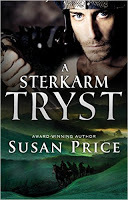 A Sterkarm Tryst, published by Open Road, is now available for pre-order by following this link.
A Sterkarm Tryst, published by Open Road, is now available for pre-order by following this link.
 A Sterkarm Tryst by Susan Pricecursing. He could curse for half an hour without drawing breath or repeating himself.
A Sterkarm Tryst by Susan Pricecursing. He could curse for half an hour without drawing breath or repeating himself.One day he misjudged his aim and gave his thumb a good wallop with his hammer. His workmates paused in their own work and waited with interest. He said, "Oh - faddle!"
His workmates stared. Then one said,
"Tha coo-ert cuss as tha couldst cuss, cost?"
This tongue-twister is an old Black Country story, handed down to me. An heirloom story. The final line is, of course, in Black Country dialect and translates as:
"Thou canst not curse as thou couldst curse, canst thou?"
In translation, it becomes quite Shakespearean. As, of course, it is, since the Black Country dialect, like many other despised English dialects, preserves a lot of older English.
What has this to do with the Sterkarms?
Well, one of the things I've been doing as I've rewritten the Sterkarms over the past year, is to make the Sterkarm's speech more archaic. So I've been grappling with one of the big, perennial problems of writing historical fiction. How do you represent the speech of historical characters?
One school of thought is that you have your characters speak in modern English because the people of the past didn't think of themselves as being 'historical.' They were right up to the minute fashionistas, and they spoke right-up-to-the-minute Latin, or Aramaic, or Anglo-Norman or whatever.
 Red Shift by Alan Garner I have a lot of sympathy with that point of view. It was handled superbly in Alan Garner's Red Shift, where one section opens with a conversation between, at first glance, American GIs during the Vietnam War. Only gradually do we realise that they are, in fact, Roman legionaries stranded 'behind the lines' in darkest Celtic Britain.
Red Shift by Alan Garner I have a lot of sympathy with that point of view. It was handled superbly in Alan Garner's Red Shift, where one section opens with a conversation between, at first glance, American GIs during the Vietnam War. Only gradually do we realise that they are, in fact, Roman legionaries stranded 'behind the lines' in darkest Celtic Britain.After all, the legionaires would have had their own slang, the equivalent of that used by soldiers in later wars. I read somewhere that a lot of our 'classical' Latin is, in fact, slang, that 'caput' actually means, not 'head' but the stopper for a jar. How true this is, I can't say, being no linguist, but it's an interesting idea. The slang of one period becomes the revered classical prose of another. At sometime in the future, 'Hey dude, wassup?' will be heard or read as, 'Dear sir, respectful greetings.'
So I could have made the Sterkarms talk in modern English - except that, in these books, 21st Century characters and 16th Century characters are together in the same time and space, via a time-machine.
I used to love the old SF series, The Time Tunnel. I've always loved the fantasy of being able to visit other times and experience what life was like then. But even as a child, it irritated me that wherever our time-travellers stepped out of their machine - whether it was Ancient Greece or Revolutionary France - they could instantly understand the locals, and the locals them. Perhaps the
 From Wikipediaseries came up with some explanation, similar to Douglas Adam's brilliant 'babel fish,' but if it did, I missed it.
From Wikipediaseries came up with some explanation, similar to Douglas Adam's brilliant 'babel fish,' but if it did, I missed it.I was determined not to make that mistake when I wrote the Sterkarms, and made it very clear that the Sterkarm's speech is not immediately understandable to their 21st Century visitors, nor vice-versa.
“Day glayder migh a finner thu!”When I wrote the first book, The Sterkarm Handshake, I kept to the rule that the Sterkarms spoke in their own dialect, or in a somewhat archaic style, if they were in the company of 21st Century people. But if they were talking among themselves, or with Andrea, who understood them, then I gave their words in modern English.
It gladdens me to find thee!
Then I wrote the third book, A Sterkarm Tryst. Most of the action takes place in the 16th Century, but there are plenty of 21st Century people (or 'Elves') milling around there. Or then. I needed to make the distinction between the Sterkarm's speech and the 'Elves'' speech clearer. And if I was going to do that in the third book, then the first two should match. So I rewrote them.
 In 'Medieval Underpants and Other Blunders' Susanne Alleyn warns historical writers against attempting 'theeing and thouing.' It is not as simple, she rightly says, as replacing 'you' with 'thou' or 'thee.' And 'thou' and 'thee' aren't interchangeable.
In 'Medieval Underpants and Other Blunders' Susanne Alleyn warns historical writers against attempting 'theeing and thouing.' It is not as simple, she rightly says, as replacing 'you' with 'thou' or 'thee.' And 'thou' and 'thee' aren't interchangeable.She's quite right. The distinction between 'you' and 'thou' is one reason I wanted to use it, because it's a distinction between formal and informal speech which has vanished from modern English, but was very much a part of the Sterkarms' world.
'Thou' and 'thee' could be used when speaking affectionately to close friends or family, which is why it has become associated with lovers' rhymes, but also when speaking to social inferiors. The meaning here would depend on context. Its use could say, "I know you and trust you well, I regard you as one of my family." Or it could say, "You are so inferior to me that I don't need to bother being polite."
'You' was used to superiors and to strangers who seemed to be of equal or superior status. As you came to know someone and were friendlier, a point was eventually reached where one person, usually the older, asked, "Shall we be 'thou' to one another?"
'You' could also be used in situations where you might actually know the person you were speaking to very well, but wanted to emphasise formality - for instance, to transpose this into today's world, two teachers who were actually good friends might address each other as 'you' in front of a class.
And 'you' could also be used as a weapon against friends, family and lovers. A sudden switch from 'thou' to 'you' signalled that not all was well and the speaker had taken it up the nose.
Indeed, I'm quite sorry that we've lost the you/thou distinction.
I still haven't explained what has all this to do with, 'Thou coo-ert cuss as tha couldst cuss, cost?'
It's simply this: I like to feel I'm standing on firm ground when I attempt something like this. How to avoid the quagmires of using 'thou' when it should be 'thee'? How to feel confident when writing it? I think a loss of confidence in a writer always shows up in the prose.
Well, my firm ground is simply this: I'm Black Country born and bred. I grew up using such words as 'malkin' (simpleton) and 'gleed' (hot coal) and pronouncing 'laugh' as Shakespeare did - as 'loff.'
Another old story. The first time a Black Country boy ever saw a (steam)-train go by, he ran screaming to his mother. "Row of housen went past like lightening and fust un's chimney was a-fire!" This boy would have worn 'shoo-en' on his feet. It's the old English plural: instead of adding 's', you added 'en.' The Laland Scots 'een' for 'eyes' has the same plural.
I grew up familiar with 'thou' and 'thee' too. Many of my grandparents' generation still used it, and certainly my great-grandparents' generation did.
My parents didn't use 'thee' and 'thou' much themselves. It had been firmly labelled 'old-fashioned' and 'uncouth' by their day. But, when telling stories of their families and joking about 'th'owd uns' they would use the form.
And he said, "Hey! Thee! Tha'd stand coal cracking on tha yed, thee!"And, 'Tha coo-ert cuss as tha couldst cuss, cost?' The phrase was preserved for the pleasure of saying it and for challenging others to say it and understand it.
And her said, 'That frock'd fit Barnum'n'Bostock's elephant. It'd just do for thee, May.'
All this was steadying as I tried to find a way for the Sterkarms to speak. I never felt I was being twee or striving for effect - After all, if beauty is in the eye of the beholder, then archaisms are in the ear of the listener and, to me, many 'quaint, archaic' phrases are simply ordinary, everyday speech.
"Ar," for 'yes' is not stage country-bumpkin but what many people I know would reply to a question. Myself included.
There's nothing 'Carry-On' or facetious about the word, 'wench.' It's the usual Black Country word for 'girl' or 'young woman' and 'our wench' means 'my sister.'
I was only trying to make the Sterkarms spake like th'owd uns.
 A Sterkarm Tryst, published by Open Road, is now available for pre-order by following this link.
A Sterkarm Tryst, published by Open Road, is now available for pre-order by following this link.
Published on May 06, 2016 16:00
April 22, 2016
72 Baps...
You butter and I'll slice.(The reaction of a Victoria Wood character on hearing that a family member had died.) Several people have commented that 'celebrities' seem to be
 Victoria Wood (wikipedia)dropping like flies this spring. I just clicked on The Guardian on-line to see that Prince was the latest.
Victoria Wood (wikipedia)dropping like flies this spring. I just clicked on The Guardian on-line to see that Prince was the latest.
But none of the deaths has saddened me as much as that of Victoria Wood.
I walked into an empty room the other day. The television was on with its sound turned down. Across the screen was a red banner, reading: Victoria Wood dead.
I stopped in mid-stride. I yelled the news aloud. From a distant corner of the house came an answering squawk of dismay. In fact, my whole family will be squawking. They all, man and woman, old and young, loved Victoria Wood.
I saw her perform live in Birmingham early in her career, without really knowing who she was. But I laughed.
Then I started seeing her on television, at a time when it was still commonly said that 'women can't be funny.' She single-handedly proved that canard to be a right load of old...
She was a brilliant writer, a superb observer and listener, writing an abundance of terrific parts for both men and women, but especially for women.
I loved her for herself, and I love her because a fond memory is of my dad laughing until he cried at her 'Ballad of Barry and Freda.' (Otherwise known as 'Let's Do It' or 'bend me over backwards on me hostess trolley.'
But however I go on, I can't write a better appreciation than this by the Guardian's Lucy Mangan, so I'll leave you with that.
And this:-
 Victoria Wood (wikipedia)dropping like flies this spring. I just clicked on The Guardian on-line to see that Prince was the latest.
Victoria Wood (wikipedia)dropping like flies this spring. I just clicked on The Guardian on-line to see that Prince was the latest.But none of the deaths has saddened me as much as that of Victoria Wood.
I walked into an empty room the other day. The television was on with its sound turned down. Across the screen was a red banner, reading: Victoria Wood dead.
I stopped in mid-stride. I yelled the news aloud. From a distant corner of the house came an answering squawk of dismay. In fact, my whole family will be squawking. They all, man and woman, old and young, loved Victoria Wood.
I saw her perform live in Birmingham early in her career, without really knowing who she was. But I laughed.
Then I started seeing her on television, at a time when it was still commonly said that 'women can't be funny.' She single-handedly proved that canard to be a right load of old...
She was a brilliant writer, a superb observer and listener, writing an abundance of terrific parts for both men and women, but especially for women.
I loved her for herself, and I love her because a fond memory is of my dad laughing until he cried at her 'Ballad of Barry and Freda.' (Otherwise known as 'Let's Do It' or 'bend me over backwards on me hostess trolley.'
But however I go on, I can't write a better appreciation than this by the Guardian's Lucy Mangan, so I'll leave you with that.
And this:-
Published on April 22, 2016 16:00
April 15, 2016
Word Obsessive
This is certainly a post for writers.
Editing and rewriting puts you in a different mind-set to plain, straight-ahead writing.

I'm editing and rewriting a lot lately. I've been rewriting the Sterkarm books, for republication this summer, and I've been rewriting a WIP progress with the working title of Bad Girl.
Rewriting always seems to make me pernickety about words.
While I'm bashing along on first drafts, thinking only of working out the plot and motivation, I don't bother much about the words. Just slam them down.
But when I'm rewriting, it all slows down. I become a bit obsessive. I think: would that character use that word?
Would this word even exist in English at this time?
Would they use that form of the word? Is it in character: would they use a slangier term, something more official, something politer - or ruder?
While rewriting, I seem to pick up the dictionary every ten minutes. I'm always worrying about exact meanings, origins, tone, colour...
A couple of years ago, while in rewriting mode, I crossed the Forth Bridge into the Kingdom of Fife (with my laptop in my luggage.) The Forth Bridge crosses the Firth of Forth; and on the other side of Scotland, there's the Solway Firth. Further north are the Cromarty and Moray Firths. I started idly wondering about this word, 'Firth.' Why, I wondered, does Scotland have firths where England
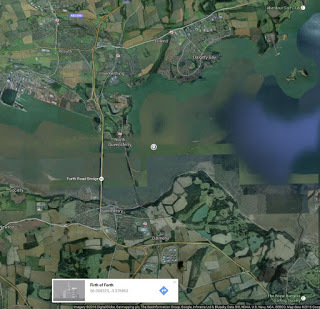 Aerial view of Forth Bridge, courtesy of Google.has channels and sounds?
Aerial view of Forth Bridge, courtesy of Google.has channels and sounds?
A firth is a long, narrow inlet of the sea. Which is exactly what a fjord is - hang on!
Scots English is even more heavily influenced by Scandinavia, and has retained more of the Anglo-Saxon than 'Standard' English, or the English further south. Could there be a connection?
In 'fjord,' the 'j' is sounded like a 'y' or 'i' while that final 'd' sounds more like 'th.'
In other words - and say this with a Scots accent - 'F-yuh-rrrrr-th.'
Firth and fjord, I thought: they're the same word! I think there are few people in the world who could be as excited as me by this. Some very junior lexicographers, perhaps. A few very naive linguists. And maybe some other writers (though, in their case, not necessarily about 'firth' and 'fjord.')
I grabbed my OED as soon as I could:
FIRTH, n. a narrow inlet of the sea. ORIGIN ME (orig. Scots), from ON fjorthr (see FJORD)
 Oh, I was very happy. The identity of 'firth' and 'fjord' is obviously a well-known fact in the dictionary-compiling community, but it had never occurred to me before, and I doubt if I would have made the connection if I hadn't been obsessing about the sounds of words and their origins, in rewrite mode.
Oh, I was very happy. The identity of 'firth' and 'fjord' is obviously a well-known fact in the dictionary-compiling community, but it had never occurred to me before, and I doubt if I would have made the connection if I hadn't been obsessing about the sounds of words and their origins, in rewrite mode.
The present bout of rewriting brought on another of these connections. I was reading something by an American, which spoke of mowing the grass in their yard.
Now, to me, 'yard' has always meant an area of hard paving or concrete, usually quite small. So the area of hard paving just outside my back-door is my 'yard.' Some of my older relatives lived in yards. An alleyway led from the street into a small square surrounded by small houses. At the centre of the square were blocks of shared lavatories and wash-houses. All of the square was paved. It was a 'yard.' These placed were often named 'Something Yard.'
So, for years, when I was younger, I imagined American streets and towns as places quite without flowerbeds or lawns - because they themselves always talked of their yards.
My mother loved flowers. She had lots of roses, lilies, magnolia and anything else she could persuade to grow. The place where they grew was 'the garden.' The garden was on the other side of the small paved 'yard.' She was happy for us to play 'on the yard.' She was not happy when we gambolled in her garden and broke down favorite plants.
At my own house, the 'garden' begins immediately on the other side of the 'yard.'
As I grew older, it slowly dawned on me that when Americans said, 'yard,' they might, just might, be talking about a place where they grew flowers, bushes and trees.
Because my brain's is rewrite mode, and is scrambling restively about among meanings and nuances of words, a casual reference started it off on: Why do Americans say 'yard' where we say 'garden'? And it suddenly dawned on me that, just like firth and fjord, they're the same word.
I was rewriting the Sterkarms, which is set among the pele towers of the Scottish Borders during the 16th Century. A pele tower had a great thick wooden door. But wooden doors could be hacked or
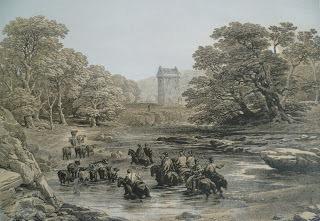 A raid on Gilknockie Towerburned down, so behind it there was a door-sized iron grille, hinged so it could be fastened across the doorway. Even if enemies succeeded in breaking through the door, they would still have to get past the iron grille, which wouldn't give way to axes or fire so easily.
A raid on Gilknockie Towerburned down, so behind it there was a door-sized iron grille, hinged so it could be fastened across the doorway. Even if enemies succeeded in breaking through the door, they would still have to get past the iron grille, which wouldn't give way to axes or fire so easily.
The technical name, among archaeologists and historians, for one of these grilles is 'a yett.' It's called that because, in the dialect of the Borders, the letter 'g' is often pronounced as 'y', as it often is in Scandinavian languages. 'Yett' is the same word as 'gate,' but with a different pronunciation.
So, I thought, 'garden' may once have been pronounced as 'yarden.'
And that 'd' in the middle of both words? Pronounce it as 'th', as in fjorth, and you have 'garth' or 'garthen.' Or even 'yarthen.' I supposed that the 'en' at the end either meant 'small' as in 'kitten' or, possibly, it was 'the'. In Scandinavian languages, the definite article is added to the end of a word. So, in Norwegian, 'book' is 'bok' - 'the book' is 'boken.'
Then there's the word, 'garth.'
garth, n Brit. 1 an open space surrounded by cloisters. 2 a yard or garden.
In Norse Myth, there is Midgarth(d) and Asgarth(d). Midgarth is often translated as 'earth' - Middle Earth, or here, this place where we all live. It's the open space, yard or garden where mankind lives. It's in the middle, because there are worlds above and beneath it.
Asgarth is the open space, yard or garden where the Aesir or gods live.
So 'garden' was once 'yarthen' or 'yarth' - which comes very close to 'earth.' ('Earth' is derived from the name of the Norse mother goddess Jord or Yorth.)
One more dive into the dictionary.
yard, n 1 chiefly British a piece of uncultivated ground adjoining a building, typically enclosed by walls. 2 N. America the garden of a house. ORIGIN OE geard 'building, home, region' from a Gmc base rel. to GARDEN and ORCHARD.
There, at the end of 'orchard' is that 'yarth' again. (And 'orchard' proves to be one of those odd, doubled words. The first syllable comes from the Latin hortus, meaning 'garden.' So orchard means 'garden-garden.' Or, I suppose, 'garden-area.')
garden, n, chiefly British, a piece of ground adjoining a house used for growing fruit, flowers or vegetables. ORIGIN ME from Old North Fr. gardin, var. of OFr jardin, of Gmc origin, rel to yard.
Don't let those Old North Fr. fool you - they were Vikings.
So now I know why Americans say 'yard' while we Brits say 'garden.' As so often, the American are using a somewhat older version of the word or phrase.

That's a relief. I can stop worrying about it now.
Editing and rewriting puts you in a different mind-set to plain, straight-ahead writing.

I'm editing and rewriting a lot lately. I've been rewriting the Sterkarm books, for republication this summer, and I've been rewriting a WIP progress with the working title of Bad Girl.
Rewriting always seems to make me pernickety about words.
While I'm bashing along on first drafts, thinking only of working out the plot and motivation, I don't bother much about the words. Just slam them down.
But when I'm rewriting, it all slows down. I become a bit obsessive. I think: would that character use that word?
Would this word even exist in English at this time?
Would they use that form of the word? Is it in character: would they use a slangier term, something more official, something politer - or ruder?
While rewriting, I seem to pick up the dictionary every ten minutes. I'm always worrying about exact meanings, origins, tone, colour...
A couple of years ago, while in rewriting mode, I crossed the Forth Bridge into the Kingdom of Fife (with my laptop in my luggage.) The Forth Bridge crosses the Firth of Forth; and on the other side of Scotland, there's the Solway Firth. Further north are the Cromarty and Moray Firths. I started idly wondering about this word, 'Firth.' Why, I wondered, does Scotland have firths where England
 Aerial view of Forth Bridge, courtesy of Google.has channels and sounds?
Aerial view of Forth Bridge, courtesy of Google.has channels and sounds?A firth is a long, narrow inlet of the sea. Which is exactly what a fjord is - hang on!
Scots English is even more heavily influenced by Scandinavia, and has retained more of the Anglo-Saxon than 'Standard' English, or the English further south. Could there be a connection?
In 'fjord,' the 'j' is sounded like a 'y' or 'i' while that final 'd' sounds more like 'th.'
In other words - and say this with a Scots accent - 'F-yuh-rrrrr-th.'
Firth and fjord, I thought: they're the same word! I think there are few people in the world who could be as excited as me by this. Some very junior lexicographers, perhaps. A few very naive linguists. And maybe some other writers (though, in their case, not necessarily about 'firth' and 'fjord.')
I grabbed my OED as soon as I could:
FIRTH, n. a narrow inlet of the sea. ORIGIN ME (orig. Scots), from ON fjorthr (see FJORD)
 Oh, I was very happy. The identity of 'firth' and 'fjord' is obviously a well-known fact in the dictionary-compiling community, but it had never occurred to me before, and I doubt if I would have made the connection if I hadn't been obsessing about the sounds of words and their origins, in rewrite mode.
Oh, I was very happy. The identity of 'firth' and 'fjord' is obviously a well-known fact in the dictionary-compiling community, but it had never occurred to me before, and I doubt if I would have made the connection if I hadn't been obsessing about the sounds of words and their origins, in rewrite mode.The present bout of rewriting brought on another of these connections. I was reading something by an American, which spoke of mowing the grass in their yard.
Now, to me, 'yard' has always meant an area of hard paving or concrete, usually quite small. So the area of hard paving just outside my back-door is my 'yard.' Some of my older relatives lived in yards. An alleyway led from the street into a small square surrounded by small houses. At the centre of the square were blocks of shared lavatories and wash-houses. All of the square was paved. It was a 'yard.' These placed were often named 'Something Yard.'
So, for years, when I was younger, I imagined American streets and towns as places quite without flowerbeds or lawns - because they themselves always talked of their yards.
My mother loved flowers. She had lots of roses, lilies, magnolia and anything else she could persuade to grow. The place where they grew was 'the garden.' The garden was on the other side of the small paved 'yard.' She was happy for us to play 'on the yard.' She was not happy when we gambolled in her garden and broke down favorite plants.
At my own house, the 'garden' begins immediately on the other side of the 'yard.'
As I grew older, it slowly dawned on me that when Americans said, 'yard,' they might, just might, be talking about a place where they grew flowers, bushes and trees.
Because my brain's is rewrite mode, and is scrambling restively about among meanings and nuances of words, a casual reference started it off on: Why do Americans say 'yard' where we say 'garden'? And it suddenly dawned on me that, just like firth and fjord, they're the same word.
I was rewriting the Sterkarms, which is set among the pele towers of the Scottish Borders during the 16th Century. A pele tower had a great thick wooden door. But wooden doors could be hacked or
 A raid on Gilknockie Towerburned down, so behind it there was a door-sized iron grille, hinged so it could be fastened across the doorway. Even if enemies succeeded in breaking through the door, they would still have to get past the iron grille, which wouldn't give way to axes or fire so easily.
A raid on Gilknockie Towerburned down, so behind it there was a door-sized iron grille, hinged so it could be fastened across the doorway. Even if enemies succeeded in breaking through the door, they would still have to get past the iron grille, which wouldn't give way to axes or fire so easily.The technical name, among archaeologists and historians, for one of these grilles is 'a yett.' It's called that because, in the dialect of the Borders, the letter 'g' is often pronounced as 'y', as it often is in Scandinavian languages. 'Yett' is the same word as 'gate,' but with a different pronunciation.
So, I thought, 'garden' may once have been pronounced as 'yarden.'
And that 'd' in the middle of both words? Pronounce it as 'th', as in fjorth, and you have 'garth' or 'garthen.' Or even 'yarthen.' I supposed that the 'en' at the end either meant 'small' as in 'kitten' or, possibly, it was 'the'. In Scandinavian languages, the definite article is added to the end of a word. So, in Norwegian, 'book' is 'bok' - 'the book' is 'boken.'
Then there's the word, 'garth.'
garth, n Brit. 1 an open space surrounded by cloisters. 2 a yard or garden.
In Norse Myth, there is Midgarth(d) and Asgarth(d). Midgarth is often translated as 'earth' - Middle Earth, or here, this place where we all live. It's the open space, yard or garden where mankind lives. It's in the middle, because there are worlds above and beneath it.
Asgarth is the open space, yard or garden where the Aesir or gods live.
So 'garden' was once 'yarthen' or 'yarth' - which comes very close to 'earth.' ('Earth' is derived from the name of the Norse mother goddess Jord or Yorth.)
One more dive into the dictionary.
yard, n 1 chiefly British a piece of uncultivated ground adjoining a building, typically enclosed by walls. 2 N. America the garden of a house. ORIGIN OE geard 'building, home, region' from a Gmc base rel. to GARDEN and ORCHARD.
There, at the end of 'orchard' is that 'yarth' again. (And 'orchard' proves to be one of those odd, doubled words. The first syllable comes from the Latin hortus, meaning 'garden.' So orchard means 'garden-garden.' Or, I suppose, 'garden-area.')
garden, n, chiefly British, a piece of ground adjoining a house used for growing fruit, flowers or vegetables. ORIGIN ME from Old North Fr. gardin, var. of OFr jardin, of Gmc origin, rel to yard.
Don't let those Old North Fr. fool you - they were Vikings.
So now I know why Americans say 'yard' while we Brits say 'garden.' As so often, the American are using a somewhat older version of the word or phrase.

That's a relief. I can stop worrying about it now.
Published on April 15, 2016 16:00
April 1, 2016
The Unexpected Animal - A Shaman Journey
Years ago, I wrote
The Ghost Drum
, about a shaman who steps into other worlds and explores them as easily as we breathe.
 Lucy Coats At the end of last year, I went on a shaman journey. Not a very long one. Barely across Shaman Street.
Lucy Coats At the end of last year, I went on a shaman journey. Not a very long one. Barely across Shaman Street.
Like the first, it was under the guidance of Lucy Coats, fellow member of the Scattered Authors Society and well known writer and witch about town.
A few years ago now, at the SAS's annual conference at Charney Manor, Lucy led a 'shaman journey' workshop. Like Lucy, who has written several retellings of myth, I love these ancient stories and their imagery and have a great interest in all things pagan and witchy. So I went along out of curiosity.
Lucy had us all lie down on the floor, close our eyes and get comfortable. Then, with her drumming and her gentle voice, she hypnotised us into a state of deep relaxation. She was going to take us on a guided journey, she said. What did we see, behind our closed eyes?
There's a proverb that I used as a touchstone while I wrote The Ghost Drum -
'When we sleep, the dreamer inside us wakes.'
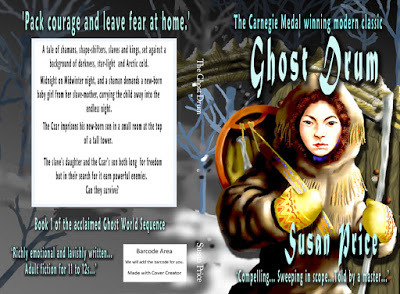
I used it to help myself imagine how someone could walk in another world - to remind myself how vivid, solid and in every way real dreams can be.
When Lucy asked us what we could see, the dreamer inside me woke, and looked up at an enormous tree towering high above, its grey branches spiralling upwards against a starred sky. I was taken aback by the strength and vividness of the image, so much so that, of course, I had to belittle it.
'Oh, of course, it's the World Tree,' I thought - something I'd been imagining since I first came across the Norse Myths at eleven. I knew that the World Tree was about as ancient a symbol as you could find, and that Siberian shamans had 'climbed the World Tree' to travel between worlds.
My mind is very well stocked with mythic images - so there was nothing very surprising in it producing one on request.
But it was so very clear and real an image. It had solidity and weight. I've seen - and touched - images as real in dreams, but my waking imagination can't attain that degree of detail. So maybe, I thought, something out of the ordinary was going on here.
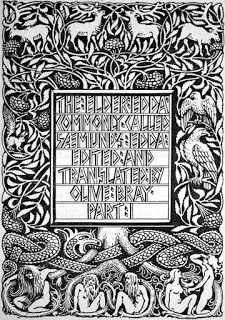 Ygdrasil - Wikipedia, public domain Maybe that's how it works, I thought. If you're taking a trip into your own inner world and dreams, you can only use the imagery in your own head. My own image of the World Tree had been with me a long time.
Ygdrasil - Wikipedia, public domain Maybe that's how it works, I thought. If you're taking a trip into your own inner world and dreams, you can only use the imagery in your own head. My own image of the World Tree had been with me a long time.
So I decided to stop bitching and let things happen. Lucy led us, with her words and drumming, along a path and to a door... Behind the door were three caves, and we were to find, if I remember correctly, a spring in one, a fire in another, and some kind of prize or gift in the third.
It was a long time ago, and I don't remember all of the experience - what did stay with me was the extraordinary reality of everything I 'saw.' There was a large bowl carved out of crystal, a burning fire lighting the darkness of a cave. Perhaps none of the imagery was very original - but then, the archetypal, by definition, is not going to be original. It was all very real. I felt the heat from that fire. If I'd put my hand into it, it would have burned.
There was also the great feeling of peace and relaxation the experience left me with when Lucy called us back. I remember thinking it a very interesting experience indeed and that if ever the chance came along to take another trip, I would jump at it.
The chance came at another SAS event - the 'Winter Warmer' held at Folly Farm in Somerset. Lucy was there, and offered another chance to take a 'shaman journey.'
The event took place at the end of November 2015, over a weekend where one storm roared into another. Or maybe it was one long storm that lasted three days. It was dark, wet and cold. Lucy suggested that we bring our duvets with us to the studio, which might be a bit draughty.
I'd had a sleepless night - as had many others, as the storm roared and stomped about the sky - and had just returned from a walk with my friend Jenny Alexander, where we'd tramped over a hill in strong winds. So I was more than willing, at Lucy's suggestion, to lie down and stretch out, snuggle into my duvet, close my eyes and - Zzzzz-Zzzzz
Unfortunately, I do snore and I did keep falling asleep. For me, Lucy's voice faded in and out...
This time, Lucy played a tape of gentle music rather than drumming but, as before, she first lulled us into a deeply relaxed state. It was very cosy, lying on the floor among my fellow Scattereds, warmly snuggled in a duvet and drifting off gently into a half-sleep.
When she had us all relaxed, Lucy suggested that we were lying cradled in the roots of a big tree, in a forest. I was there! I felt the roots around me, smelled the leaf-mould and earth, looked up and saw the branches and leaves above, scattering the light.
As others said, the sound of the storm outside helped our imaginations - we didn't have to call up the sound of wind soughing in branches. It was soughing like billy-o. My imagination, somehow boosted or freed by the hypnotism, worked at full strength, using all my memories of trees and woods, weaving them together into a - well, a virtual reality. An alternative reality. I could smell the forest. I could hear it. I could feel those cradling roots.
I've experienced this other-worldly reality in dreams but here, I wasn't exactly asleep. I wasn't exactly awake either. I kept drifting off - but then I'd hear a snatch of what Lucy said, or a whisper or movement from one of the others around me.
An animal is going to come to you, Lucy said. It doesn't matter what kind.
Oh, it'll be a cat, thought my doubting mind. I like cats, I had a cat narrate the Ghost World books, it'll be a cat for sure.
So I 'looked around' as it were, into the wood, fully expecting to see a cat. Trying to see a cat. Probably my ex-cat, Biffo.
Coming through the trees, I saw a huge white stag. Plain as anything, there was this huge white stag with an enormous spread of antlers -
No, no, I thought. Hang on. Return to sender. This is wrong. Should be a cat. Stands to sense it should be a cat.
The stag came on regardless. It was white, it had a big mane or ruff of fur around its
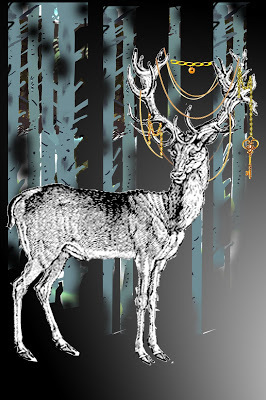 shoulders, and from the great tree of its antlers hung golden chains, bells, apples, and a golden key. These golden ornaments swung as the stag came, catching the dim woodland light and shining.
shoulders, and from the great tree of its antlers hung golden chains, bells, apples, and a golden key. These golden ornaments swung as the stag came, catching the dim woodland light and shining.
(Since I've been trying to learn to use graphics programmes, I tried to make something like what I saw, but the stag in my image is Bewick's engraved stag and much daintier than the white stag I saw in my dream or whatever it was. The stag I saw was a much beefier, shaggier specimen with heftier antlers.)
If, awake, I'd tried to imagine how a stag would walk, I doubt I could do a very good job, but here I saw each movement of the head and hooves.My subconscious was drawing, I suppose, on a lifetime of BBC Wildlife documentaries.
Follow your animal, Lucy said. It will take you to your special place, your safe place.
I can't remember exactly what Lucy said about this place, because I kept drifting off to sleep, but I think it was the place where you can go for inspiration, if you need an idea or a solution to a problem. The place where your imagination lives and springs from.
So, I got up and went with the stag. He greeted me by blowing on my hand, and I felt his warm breath. I felt his fur (which I suspect felt more like a cat's fur than a deer's, since I don't think I've ever touched a deer's fur in my life.) I walked at his shaggy shoulder and he led me uphill through the trees that arched overheard and rutted the track with their roots.
Your animal will bring you to a door, Lucy said, and the stag led me to a small wooden door. of thick planks, set in the hillside.
Your animal will give you the key.
And there was a big golden key hanging from a chain on the stag's antlers. He lowered his head so I could take it.
I turned the key and ducked through the low door into a dim, round, warm little place. There were wooden beams, an open fire, and benches covered with hides and fur. I think it probably owed a great deal to a yurt I once ate venison and blueberries in, in Arctic Finland, and maybe a little to Scara Brae, the Stone Age village in the Orkneys. It was a very nice little gaffe to find inside your own head, and certainly felt safe and warm, but my memories of this 'shaman journey' weren't of 'the safe place' but of meeting that amazing and unexpected stag.
Why a stag? And why one bedecked in gold chains? - If, waking, I'd been asked to predict what animal would appear in this half-dream, I'd have said, a cat. Maybe a dog. If pushed to be a bit more dramatic, I might have said, 'A wolf,' since I've several times written about wolves. But never a stag with gold hanging from its antlers
It's this quality of the unexpected, as well as the vivid detail, that makes these experiences, for me, so strange and so interesting. I remember the feeling of surprise, even shock, when I 'saw' the stag. I expected to be in control, to be able to 'order up' the expected cat. But I had no control. I wasn't expecting the stag, but there he was, gold and all, and there was no getting rid of him.
At the end, we sat up and recounted what we'd seen. I was glad that my inevitable snoring had turned into 'a giant in a cave' for another traveller. Everyone had 'seen' an animal and had been led to a secret, special place - but it's for them to give their account of their journeys, if they choose, not for me.
I've tried repeating this experience, but it's not easy without Lucy's soothing voice.
Thank you, Scattered Authors Society, and especial thanks to Lucy Coats, for making this trip into my own head possible.
Lucy Coats' website is here.
And here is Lucy on 'creative napping.'
 Lucy Coats At the end of last year, I went on a shaman journey. Not a very long one. Barely across Shaman Street.
Lucy Coats At the end of last year, I went on a shaman journey. Not a very long one. Barely across Shaman Street.Like the first, it was under the guidance of Lucy Coats, fellow member of the Scattered Authors Society and well known writer and witch about town.
A few years ago now, at the SAS's annual conference at Charney Manor, Lucy led a 'shaman journey' workshop. Like Lucy, who has written several retellings of myth, I love these ancient stories and their imagery and have a great interest in all things pagan and witchy. So I went along out of curiosity.
Lucy had us all lie down on the floor, close our eyes and get comfortable. Then, with her drumming and her gentle voice, she hypnotised us into a state of deep relaxation. She was going to take us on a guided journey, she said. What did we see, behind our closed eyes?
There's a proverb that I used as a touchstone while I wrote The Ghost Drum -
'When we sleep, the dreamer inside us wakes.'

I used it to help myself imagine how someone could walk in another world - to remind myself how vivid, solid and in every way real dreams can be.
When Lucy asked us what we could see, the dreamer inside me woke, and looked up at an enormous tree towering high above, its grey branches spiralling upwards against a starred sky. I was taken aback by the strength and vividness of the image, so much so that, of course, I had to belittle it.
'Oh, of course, it's the World Tree,' I thought - something I'd been imagining since I first came across the Norse Myths at eleven. I knew that the World Tree was about as ancient a symbol as you could find, and that Siberian shamans had 'climbed the World Tree' to travel between worlds.
My mind is very well stocked with mythic images - so there was nothing very surprising in it producing one on request.
But it was so very clear and real an image. It had solidity and weight. I've seen - and touched - images as real in dreams, but my waking imagination can't attain that degree of detail. So maybe, I thought, something out of the ordinary was going on here.
 Ygdrasil - Wikipedia, public domain Maybe that's how it works, I thought. If you're taking a trip into your own inner world and dreams, you can only use the imagery in your own head. My own image of the World Tree had been with me a long time.
Ygdrasil - Wikipedia, public domain Maybe that's how it works, I thought. If you're taking a trip into your own inner world and dreams, you can only use the imagery in your own head. My own image of the World Tree had been with me a long time.So I decided to stop bitching and let things happen. Lucy led us, with her words and drumming, along a path and to a door... Behind the door were three caves, and we were to find, if I remember correctly, a spring in one, a fire in another, and some kind of prize or gift in the third.
It was a long time ago, and I don't remember all of the experience - what did stay with me was the extraordinary reality of everything I 'saw.' There was a large bowl carved out of crystal, a burning fire lighting the darkness of a cave. Perhaps none of the imagery was very original - but then, the archetypal, by definition, is not going to be original. It was all very real. I felt the heat from that fire. If I'd put my hand into it, it would have burned.
There was also the great feeling of peace and relaxation the experience left me with when Lucy called us back. I remember thinking it a very interesting experience indeed and that if ever the chance came along to take another trip, I would jump at it.
The chance came at another SAS event - the 'Winter Warmer' held at Folly Farm in Somerset. Lucy was there, and offered another chance to take a 'shaman journey.'
The event took place at the end of November 2015, over a weekend where one storm roared into another. Or maybe it was one long storm that lasted three days. It was dark, wet and cold. Lucy suggested that we bring our duvets with us to the studio, which might be a bit draughty.
I'd had a sleepless night - as had many others, as the storm roared and stomped about the sky - and had just returned from a walk with my friend Jenny Alexander, where we'd tramped over a hill in strong winds. So I was more than willing, at Lucy's suggestion, to lie down and stretch out, snuggle into my duvet, close my eyes and - Zzzzz-Zzzzz
Unfortunately, I do snore and I did keep falling asleep. For me, Lucy's voice faded in and out...
This time, Lucy played a tape of gentle music rather than drumming but, as before, she first lulled us into a deeply relaxed state. It was very cosy, lying on the floor among my fellow Scattereds, warmly snuggled in a duvet and drifting off gently into a half-sleep.
When she had us all relaxed, Lucy suggested that we were lying cradled in the roots of a big tree, in a forest. I was there! I felt the roots around me, smelled the leaf-mould and earth, looked up and saw the branches and leaves above, scattering the light.
As others said, the sound of the storm outside helped our imaginations - we didn't have to call up the sound of wind soughing in branches. It was soughing like billy-o. My imagination, somehow boosted or freed by the hypnotism, worked at full strength, using all my memories of trees and woods, weaving them together into a - well, a virtual reality. An alternative reality. I could smell the forest. I could hear it. I could feel those cradling roots.
I've experienced this other-worldly reality in dreams but here, I wasn't exactly asleep. I wasn't exactly awake either. I kept drifting off - but then I'd hear a snatch of what Lucy said, or a whisper or movement from one of the others around me.
An animal is going to come to you, Lucy said. It doesn't matter what kind.
Oh, it'll be a cat, thought my doubting mind. I like cats, I had a cat narrate the Ghost World books, it'll be a cat for sure.
So I 'looked around' as it were, into the wood, fully expecting to see a cat. Trying to see a cat. Probably my ex-cat, Biffo.
Coming through the trees, I saw a huge white stag. Plain as anything, there was this huge white stag with an enormous spread of antlers -
No, no, I thought. Hang on. Return to sender. This is wrong. Should be a cat. Stands to sense it should be a cat.
The stag came on regardless. It was white, it had a big mane or ruff of fur around its
 shoulders, and from the great tree of its antlers hung golden chains, bells, apples, and a golden key. These golden ornaments swung as the stag came, catching the dim woodland light and shining.
shoulders, and from the great tree of its antlers hung golden chains, bells, apples, and a golden key. These golden ornaments swung as the stag came, catching the dim woodland light and shining.(Since I've been trying to learn to use graphics programmes, I tried to make something like what I saw, but the stag in my image is Bewick's engraved stag and much daintier than the white stag I saw in my dream or whatever it was. The stag I saw was a much beefier, shaggier specimen with heftier antlers.)
If, awake, I'd tried to imagine how a stag would walk, I doubt I could do a very good job, but here I saw each movement of the head and hooves.My subconscious was drawing, I suppose, on a lifetime of BBC Wildlife documentaries.
Follow your animal, Lucy said. It will take you to your special place, your safe place.
I can't remember exactly what Lucy said about this place, because I kept drifting off to sleep, but I think it was the place where you can go for inspiration, if you need an idea or a solution to a problem. The place where your imagination lives and springs from.
So, I got up and went with the stag. He greeted me by blowing on my hand, and I felt his warm breath. I felt his fur (which I suspect felt more like a cat's fur than a deer's, since I don't think I've ever touched a deer's fur in my life.) I walked at his shaggy shoulder and he led me uphill through the trees that arched overheard and rutted the track with their roots.
Your animal will bring you to a door, Lucy said, and the stag led me to a small wooden door. of thick planks, set in the hillside.
Your animal will give you the key.
And there was a big golden key hanging from a chain on the stag's antlers. He lowered his head so I could take it.
I turned the key and ducked through the low door into a dim, round, warm little place. There were wooden beams, an open fire, and benches covered with hides and fur. I think it probably owed a great deal to a yurt I once ate venison and blueberries in, in Arctic Finland, and maybe a little to Scara Brae, the Stone Age village in the Orkneys. It was a very nice little gaffe to find inside your own head, and certainly felt safe and warm, but my memories of this 'shaman journey' weren't of 'the safe place' but of meeting that amazing and unexpected stag.
Why a stag? And why one bedecked in gold chains? - If, waking, I'd been asked to predict what animal would appear in this half-dream, I'd have said, a cat. Maybe a dog. If pushed to be a bit more dramatic, I might have said, 'A wolf,' since I've several times written about wolves. But never a stag with gold hanging from its antlers
It's this quality of the unexpected, as well as the vivid detail, that makes these experiences, for me, so strange and so interesting. I remember the feeling of surprise, even shock, when I 'saw' the stag. I expected to be in control, to be able to 'order up' the expected cat. But I had no control. I wasn't expecting the stag, but there he was, gold and all, and there was no getting rid of him.
At the end, we sat up and recounted what we'd seen. I was glad that my inevitable snoring had turned into 'a giant in a cave' for another traveller. Everyone had 'seen' an animal and had been led to a secret, special place - but it's for them to give their account of their journeys, if they choose, not for me.
I've tried repeating this experience, but it's not easy without Lucy's soothing voice.
Thank you, Scattered Authors Society, and especial thanks to Lucy Coats, for making this trip into my own head possible.
Lucy Coats' website is here.
And here is Lucy on 'creative napping.'
Published on April 01, 2016 16:00
March 18, 2016
The Hungry Gap and The Sterkarm Tryst
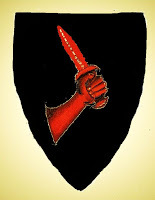 I was having a bit of a discussion with my editor, Matrice, who is working on A Sterkarm Tryst.
I was having a bit of a discussion with my editor, Matrice, who is working on A Sterkarm Tryst.She wanted to know what season of the year the book was set in, because my descriptions confused her. Sometimes she thought it sounded early in the year, and sometimes it sounded late.
It's set in late summer, or early autumn, I said. Crops are almost ready for harvest but not quite yet. Some leaves are starting to turn, but there are still late flowers. Some berries are ripe, many still unripe.
This season was always a good time to fit in a bit of swift aggro. The fiercely cold winters of the 16th Century hadn't set in yet, and if you acted quickly, you could clobber your opponents during 'the hungry gap.' And perhaps be a little less hungry yourself.
The Hungry Gap fell around July or August and reminds us how seasonal life was in the past, and how much we've lost touch with that seasonality.
The harvest was gathered in roughly around the end of August and into September. Hay was made and grain was cut, threshed, stored. Fruit, nuts and mushrooms were gathered and stored. Throughout the summer, cows had been milked and the milk turned into butter and cheese for storing. Eggs were preserved.
It was expensive to keep animals alive through the winter - you had to shelter them and feed them. So most unwanted animals were sold earlier in the year, when they were young and, of the rest, only the best were kept alive. The rest were slaughtered around mid-October, and the meat smoked, salted or dried.
All the hard work was celebrated with a party - and most other big parties, such as weddings, were also held at this time of the year, because there was plenty of fresh food. You had a blow-out at Christmas, of course, to help everybody get through that cold, dark part of the year. And then you carefully tended what you had in store to get you through the rest of the year until the next harvest.
God bless the master of this house,The mistress also.And all the little childer that round the table goo -God bless the house, the barn, the byreThe dog outside the door.God bless what'er you have in store -And give you ten times more!
The Soul-Cake Carol.
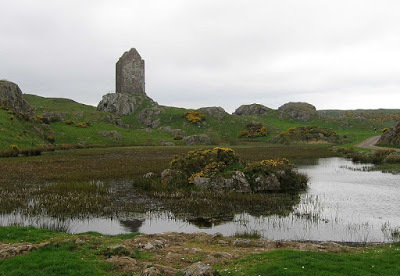 Smailholm Tower, wikipedia - click for creditHouseholds like the Bedesdale Tower in the Sterkarm books wouldn't have been small. 'Family' at the time was often understood to include servants as well as blood relatives, and the family living at the tower would have included men at arms, many maids, cattle men, kennel men, stable boys and so on. Most of them would have expected to be fed from the tower's stores as part of their wages. That's why the tower's yard is crowded with storehouses, the upper storeys of which serve as dormitories.
Smailholm Tower, wikipedia - click for creditHouseholds like the Bedesdale Tower in the Sterkarm books wouldn't have been small. 'Family' at the time was often understood to include servants as well as blood relatives, and the family living at the tower would have included men at arms, many maids, cattle men, kennel men, stable boys and so on. Most of them would have expected to be fed from the tower's stores as part of their wages. That's why the tower's yard is crowded with storehouses, the upper storeys of which serve as dormitories.Every large farmhouse would have needed to feed a crowd every day, too. Imagine being the women who had to oversee those stores and manage them. That's why, from the Viking Age onwards, the sign of a woman in charge of a household was a large bunch of keys hanging at her waist - to keep those stores locked up!
The stores dwindled day by day with every meal served. That Christmas feast had to be planned. As the year turned into spring, the level of grain in the bins dropped. The cheeses and blocks of butter were eaten up. The barrels of salted meat and fish were emptied. The flitches of bacon were carved up.
By the time July was reached, there were far more empty barrels than full and people were heartily sick of dried, salted and smoked food - but nothing in the fields or hedges or woods was yet ripe.
People ate the first hawthorn leaves, calling them 'bread and cheese.' The harvest of fresh food must have been looked forward to so keenly.
Today, when we can nip out to the supermarket and buy fresh food regardless of the time of year, and keep bags of frozen (and almost fresh) food in our home-freezers, we have forgotten 'the hungry gap.' Imagine standing in a summer field - wheat or oats tall and waving, hedgerows thick with flowers and leaves, little garden brimming with greenery - and nothing ready to eat.
If the weather was poor and held back the harvest, then the wait was longer - and the food in store still went on dwindling, day by day. The gap in those years was wider and hungrier.
If you struck at your enemy at this time of year, burned and trampled the crops standing in their fields - burned or stole what they had left in store - burned their houses - then you ensured that they had a miserable, hungry winter ahead of them. 16th Century winters weren't like ours have been of late. At that time, the Thames was expected to freeze solid every year - and the Sterkarms live much further north, on the Scottish borders.
Matrice was not altogether convinced by my talk of the hungry gap - she's a good editor and it's her job to question. She said that her Irish ancestors didn't have a hungry gap because they planted relays of potatoes and other vegetables from early in the year, to take them through summer.
Yes, but the Sterkarms would never have seen a potato or heard of one. The historical parts of the books are set, roughly, about 1520. This is something like 200 years before potatos became a staple crop in Ireland and the Scottish Highlands.
And although improvements in technology and agriculture were being made, the developments that really changed things came later. The north country reivers didn't go in much for arable farming - they were, as their ancestors had been for centuries, practicers of 'transhumance.' That is, they were cattle-farmers who moved their animals between sheltered lowland pastures and higher meadows for summer grazing.
They grew oats for grain, because it was the only cereal that grew at all well so far north, and such fruit and vegetables as they had would have been much closer to the wild variety - or actually were the wild variety, gathered from woods, moors and hedgerows.
Some of my Scottish friends have doubted this since, for them, the 'Kingdom of Fife' is 'the UK's bread-basket' with its wide and beautiful fields of wheat. But Fife only became so productive of wheat after the agricultural revolution of the mid to late 1700s, when more intensive and scientific methods of farming were introduced, together with the development of hardier and/or more productive strains of wheat.
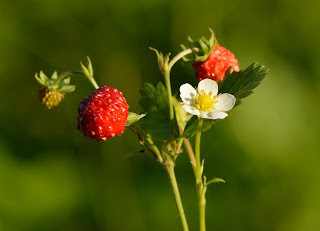 wikimedia: wild strawberry - click for credit
wikimedia: wild strawberry - click for creditFor instance, I have strawberries in my garden that ripen early in the
summer, and some that ripen in the autumn - but these are varieties that have been bred by intensive modern agriculture. The Sterkarms' strawberries would have been wild ones. They flower, fruit - and that's your lot until next year. Wild strawberries are doing it for themselves, not for us.
It reminds me of my beautiful dog-rose, which has a brief burst of flowers every year. They last about three weeks and then - no matter how much I dead-head - they're gone. Everything about life in the past must have had the same aching transience - Come and kiss me, Sweet and Twenty, Youth's a thing will not endure!
Their warm, light summers were brief and followed by a long, dark and grindingly cold winter, in dwellings which were hard to keep warm. How they must have longed, even more than us, for spring and summer, and how they must have tried to enjoy every warm day - every snowdrop, every violet, every hedge rose.
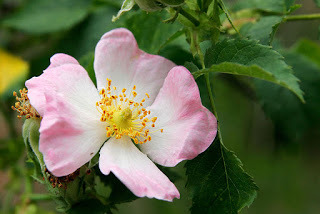 Wild rose, wikipedia - click for credit
Wild rose, wikipedia - click for creditFor the Sterkarms, after the relief and joy of harvest, would have come October, November, December, January, February... with the weather becoming more flesh-nippingly cold all the time.
Then April, May - things are beginning to leaf and flower, but there's still nothing much you can eat.
Then June, July - it's warmer and lighter, but still nothing's ripe - and your stores are running very, very low. August must have been torture! Everything visibly ripening but still not quite there.
And this was in a good year. In the modern West, we don't know how lucky we are.
Published on March 18, 2016 17:00
Susan Price's Nennius Blog
"I have made a little heap of all I've found..."
"I have made a little heap of all I've found..."
...more
- Susan Price's profile
- 71 followers



